A Legacy of Learning

westminster seminary california SPRING 2023
LEGACY OF LEARNING
by Joshua J. Van Ee
MAKING HASTE, SLOWLY by Josh Feil
A LIFETIME APPRENTICESHIP by Judith Riddell
2023 den Dulk Lectures on Pastoral Ministry with Dr. Sinclair B. Ferguson
+
It was such a joy to see so many of you at our 2023 Annual Conference in January. One of the regular highlights of the academic year for me – in addition to the new student reception in the fall and the graduating student reception in the spring – is fellowshipping and studying God’s Word with our friends and alumni at our Annual Conference. At this year’s conference, I had the privilege of speaking about the gift of faith; not just the gift of faith that we receive from the Spirit, but the gift of faith that we share with the world. The church has a glorious and sacred duty to pass down the faith from generation to generation in every nation, tongue, and people group.
Westminster Seminary California exists to serve the global church. While the majority of our students come from and will minister in churches in the United States, we have been blessed to receive many students from around the world, who eventually return to their home countries equipped to serve their local churches. In next fall’s UPDATE you will read about a group of WSC students who took a short-term missions trip to Japan this April, meeting with WSC alumni and learning about the needs of Christ’s church in Japan. Our goal is to coordinate similar trips to other countries each year to expose our students to the strengths and needs of the global church. We are thankful that the Lord has been pleased to use so many Westminster alumni in His service around the world as pastors, missionaries, and teachers.
In this issue, Dr. Joshua Van J. Ee examines how a WSC education prepares those called to a teaching vocation (p. 4). Alumna Judith Riddell explains how her time at Westminster grew her as a teacher in Northern Ireland (p. 20). Current student Josh Feil shares about his experience at WSC and as a classical school teacher in the Pacific Northwest (p. 8). Finally, Dawn and Henry Doorn reflect on the continued importance of WSC’s mission as they near retirement (p. 30).
Thank you for your prayerful support of our students as they prepare to serve Christ’s church wherever the Lord may send them.

Cordially in Christ,
Joel E. Kim WSC President
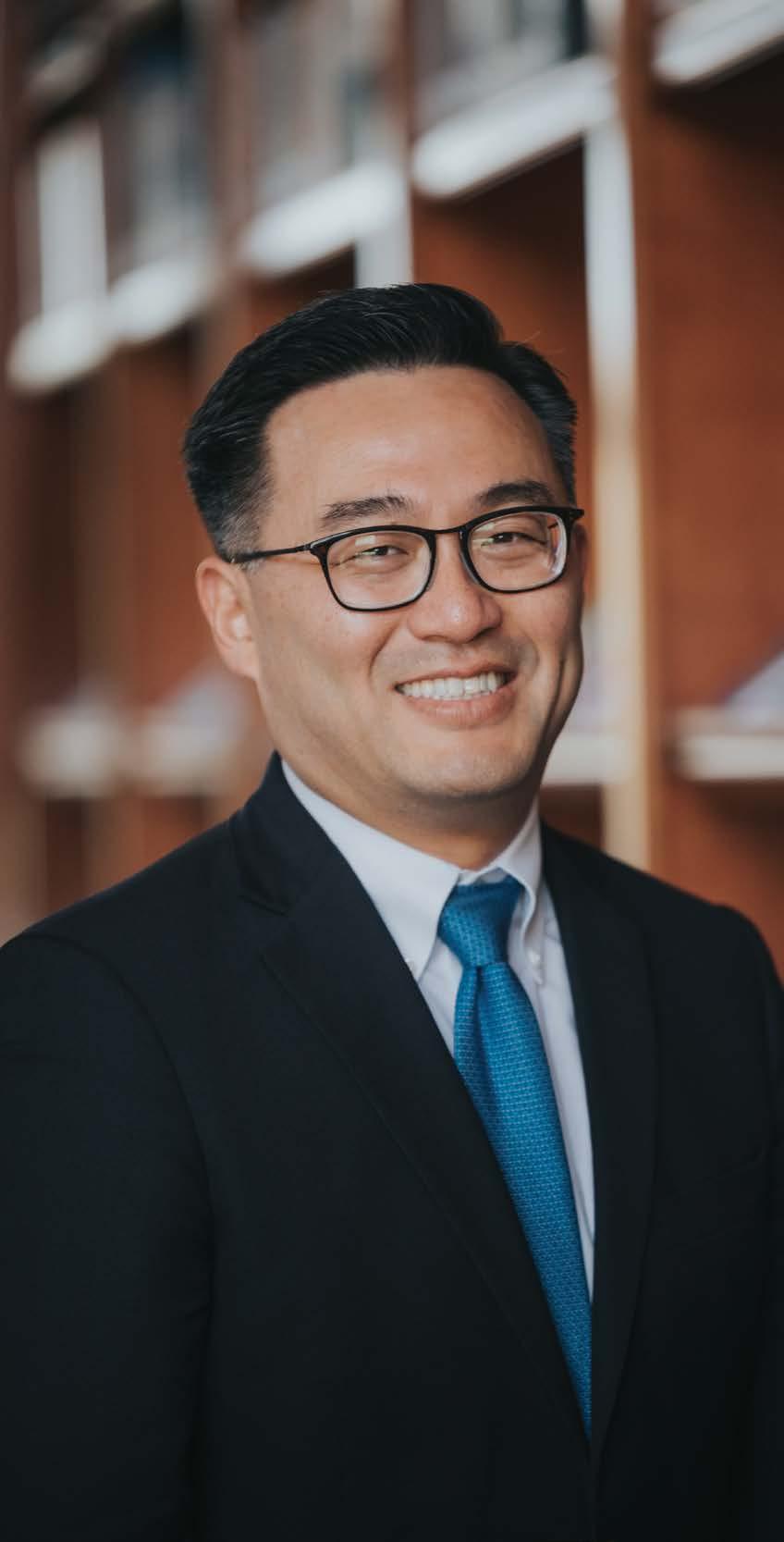
2 UPDATE | SPRING 2023
PRESIDENT'S CORNER
15:20
“It has always been my ambition to preach the gospel where Christ was not known, so that I would not be building on someone else’s foundation.”
ROM.
UPDATE | SPRING2023
PRESIDENT
Joel E. Kim
EDITOR
Marcus McArthur
DESIGNER
Megan York
PRINTER
Streeter Printing
UPDATE magazine is a publication of Westminster Seminary California.
For address changes, duplicate mailings, or additional magazine requests, please write or call.
Westminster Seminary California
1725 Bear Valley Parkway
Escondido, CA 92027
PHONE (888) 480-8474
FAX (760) 480-0252
EMAIL development@wscal.edu
WEBSITE www.wscal.edu
PERMISSIONS: UPDATE grants permission for any original article to be photocopied and distributed, permitted that the wording is not altered in any way, no fee is charged beyond the cost of reproduction, and no more than 500 copies are made. Any exceptions to the above must be explicitly approved by Westminster Seminary California. Please include the following statement on any distributed copy: This article originally appeared in UPDATE, a publication of Westminster Seminary California (WSC) and is reprinted with permission. For more information about WSC, visit www.wscal.edu or call (888) 480-8474.
MISSION: The purpose of UPDATE is to showcase Westminster Seminary California’s distinctively Christ-centered, graduate education through the work of its faculty, students and alumni who are serving as pastors, teachers, missionaries, and leaders worldwide in light of our overarching mission “to glorify God through graduate theological study. . . for those who will serve in the Christian community and the larger society.”
Since 1979, Westminster Seminary California has offered a distinctly Reformed and rigorous education in order to glorify Christ, promote His Gospel, and serve His Church. The strength of our degree programs lies in our faculty’s unified commitment to the inerrant Scriptures and the Reformed confessions. Westminster Seminary California is the only dually accredited seminary in the Western United States serving confessionally Reformed churches.
2022-2023 BOARD OF TRUSTEES
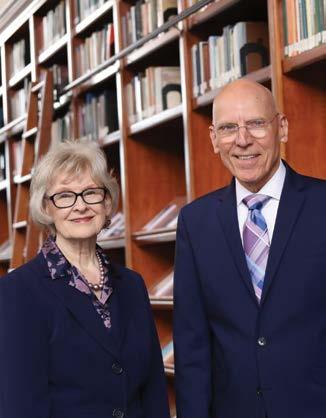
Mr. Daniel J. Bryant
Rev. CJ Den Dulk
Mr. Lyle Faber
Rev. Joel D. Fick
Rev. Dr. David W. Hall
Mr. Milton D. Hodges
Dr. Solomon Jo
Rev. Dr. Terry Johnson
Rev. Dr. Lloyd H. Kim
Rev. Eric Landry
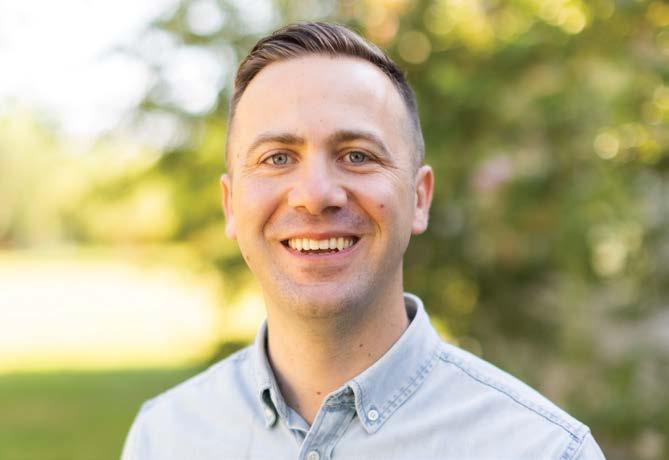
Mr. Mark Memmelaar
Rev. Steven D. Oeverman
Mr. Ronald W. Prins
Mr. Roger A. Swets
Rev. Dale A. Van Dyke
Mr. Kent Van Groningen
Dr. Thomas D. Vander Veen

©2023 Westminster Seminary California
All rights reserved.
Legacy of Learning by Joshua J. Van Ee
Making Haste, Slowly by Josh Feil
Jason Pickard Hire
W. Robert Godfrey Chair
2023 den Dulk
Lectures
2023 Annual Conference
WSC Village
A Lifetime Apprenticeship by Judith Riddell
Alumni Winter Refresher
3 wscal.edu
Alumni News Updates Faculty Speaking and Writing Honorarium + Memorial Gifts UP CLOSE with Dawn and Henry Doorn 04 08 10 12 14 16 19 20 22 24 26 28 30 CONTENTS 20 30 IN FOCUS ON CAMPUS ON MISSION IN PERSON & IN PRINT 04 08
by JOSHUA J. VAN EE
LEGACY OF LEARNING
Earlier this year, my youngest asked if I would help him study for his ninth grade Bible test on the covenants. As we sat down and he answered the review questions, I was very pleased to hear him recite much of what I teach in my Old Testament classes. It was obvious that his ninth grade Bible teacher was a former student of mine at Westminster who had taken good notes in class!
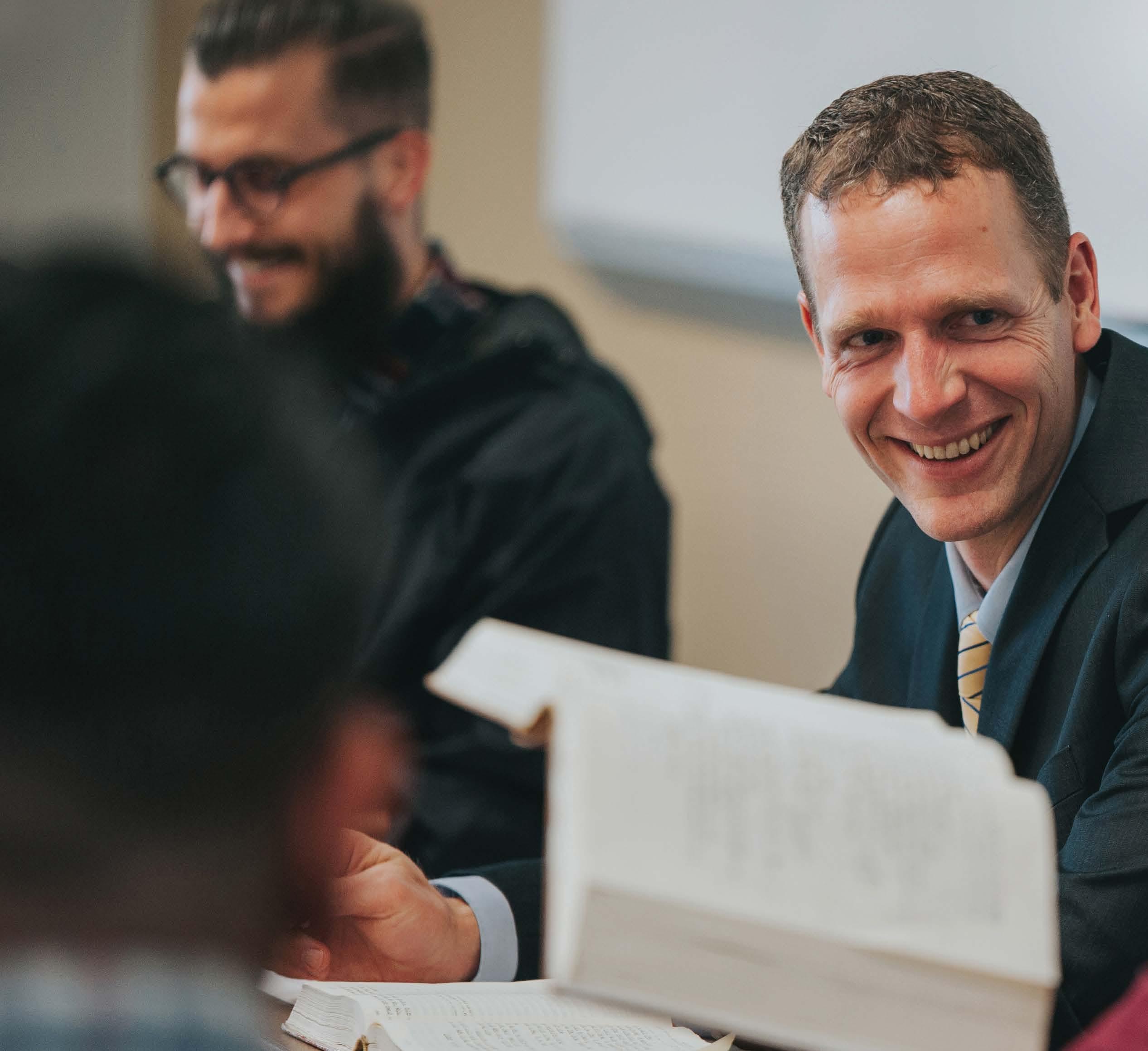
I am a fan of and advocate for Christian education. I have served for ten years on the board of trustees at the K-12 Christian school that my children attend. I do not think Christian schooling is the only proper choice for Christian parents as they seek to educate their children, but I think it can be a great option. However, to be a great option, a Christian school needs
many dedicated and faithful men and women in a variety of roles, with teachers being one if not the most important. One struggle we have had on the board, especially in the last few years, has been finding quality reformed teachers, those who know their subject area and reformed theology well and can express both through their classroom teaching. There is a need for more reformed teachers!
I have rejoiced as a number of Westminster graduates have pursued teaching in a Christian school as a career path. Currently at the school my kids attend, we are blessed to have three of my former students on faculty, including my son's 9th grade Bible teacher. In two other nearby schools, I know of at least five other graduates who are using their degrees to teach. And
4 UPDATE | SPRING 2023 IN FOCUS
there are many more throughout the country and the world. It may surprise you, but not all of these Westminster graduates are serving as Bible teachers at their Christian school, teaching subjects like biblical interpretation, theology, and church history. Many are, but a good percentage are serving in the humanities more broadly, teaching classes in history, literature, writing, speech, debate, logic, rhetoric, and classical languages. I even know of one who is teaching high school science. To teach in these fields, these graduates are often using the training and degrees they received as undergraduates before coming to Westminster, especially the one teaching science. However, I would argue that their time at Westminster further prepared them for their teaching career.
To begin with, a greater understanding of God's word, theology, and church history will benefit every Christian. Our view of God, his world, and our place in it will affect how we think about all of life, including our vocations such as teaching. Teachers, no matter their subject matter, are forming their students, and thus, their own personal spiritual maturity is crucial as they help students grow and mature. At Westminster, we seek to be a place where students both in and outside of class can participate in a community where the gospel is central and we can spur each other on in the Christian life.
In what follows, I want to focus more specifically on how a Westminster education can prepare future teachers in both content and thought, although to varying levels of specific applica-

5 wscal.edu
“Teachers, no matter their subject matter, are forming their students, and thus, their own personal spiritual maturity is crucial as they help students grow and mature.”
tion. I imagine, the area of content is what most people think about as they consider further studies. If a teaching job will require someone to describe how the various sacrificial offerings and washings described especially in Leviticus operated in the life of Old Testament Israel, it is great to have a class that describes the workings of the sacrificial-ceremonial system and its significance, like my Old Testament class on the Pentateuch. If a student takes good notes in class and studies the material, they will have a great resource to turn to on what to teach and how. Many other examples could be provided from the various classes covering the main areas of biblical studies, systematics, and church history.
However, what I have called “thought” is really the goal of a Westminster education and of great benefit to those desiring to teach. By the contrast between content and thought, I am seeking to get at the distinction between information and mental formation. At Westminster, our goal is not just to fill students' heads with a bunch of facts but to train them to think, to equip them with a mental skill set for a life of productive scholarship. For example, informing someone of the correct interpretation of a biblical passage is a good thing, but training them how to be a biblical interpreter is much better. There is a difference between knowing some theological or historical facts and being able to think theologically or historically. The analogy
often used is between giving someone a fish and teaching them how to fish; the latter obviously provides greater returns in the long run.
Having made that distinction, I do not want to downplay the importance of content. Content and thought are not in conflict since it takes a good deal of knowledge to think properly about a subject. Information is needed for mental formation, but the former should serve the latter. For example, students need to learn a number of subject areas, such as textual criticism and lexical semantics, before they can become careful interpreters of the biblical text. Without mastering the content, they cannot acquire the skill set needed. But the content is taught and used to develop those skills, to train students how to think as careful readers of God's word.
As students study with experts in their various fields at Westminster, their vision will expand. In an area of study, it is necessary to get the lay of the land, including its unique vocabulary, major players, and areas for debate. All of this will stretch a student's mind so that they may have even more questions after a class since it has introduced them to areas and subjects they had never thought about before. And as professors are describing the scope of a subject, they are also providing guidance on what is most important and the best interpretations. They walk students through various passages or issues so students can correctly appreciate what is at stake and the best way forward.
In this way, the content provides the context for the training of thought. Students learn not only the subject matter, but how to engage the issues and come to correct conclusions. For a graduate looking to teach, the content covered in a Westminster education will be more or less relevant to what they are required to teach, but the mental skills learned in the process will prove to be most valuable and transferable to different areas of study.
Another way to show the benefits of a Westminster education for someone who wants to teach is to note how it continues a student's training in the liberal arts. Most people are probably familiar with the terminology of a liberal arts education, associating it rightly with a plan of
study that seeks to train students in a broad scope of subjects. However, the purpose of a liberal arts education is not just to expose students to those subjects, but to use them to train students how to think, much as was emphasized above. Traditionally, there are seven liberal arts which are divided into two categories, the trivium and quadrivium. These areas of study were viewed as most conducive to training someone how to think linguistically, with language (the trivium), and mathematically, with numbers (the quadrivium). At Westminster, our curriculum trains students to varying degrees in the three liberal arts of the trivium: grammar, logic, and rhetoric. Not surprisingly, seminary does not require much math! I will provide some examples, focusing on one area close to my heart as a biblical studies professor.
At Westminster, we place an emphasis on the original languages in which the Bible was written. Students must first complete their training in Hebrew and Greek before they can take the courses covering the different parts of the Bible and the areas of systematic theology. This requirement allows us to study the Bible and theology in more depth and detail.

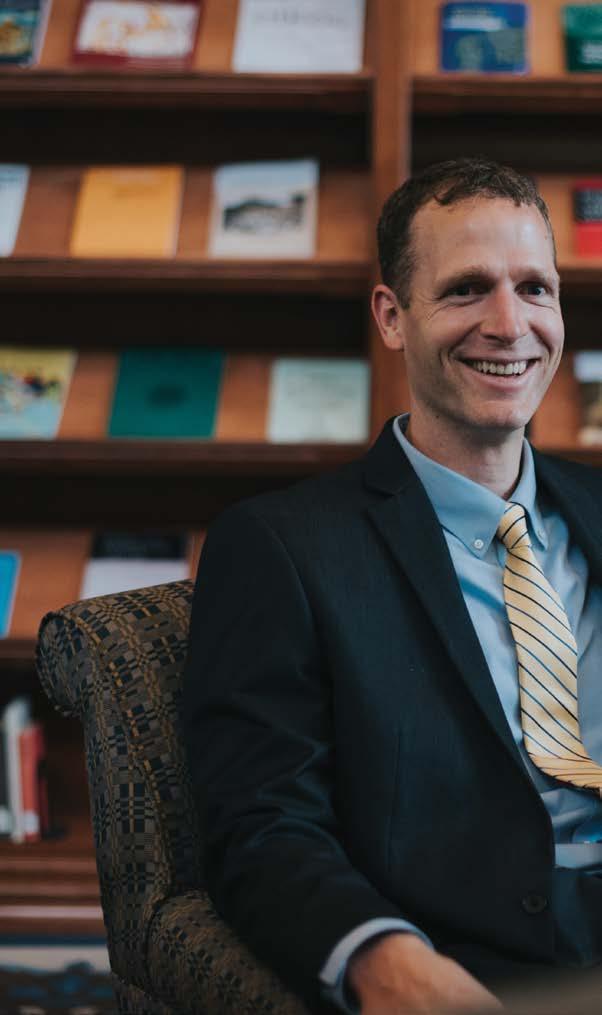
UPDATE | SPRING 2023
For a student looking to teach, learning Hebrew and Greek is certainly essential if they are going to teach the biblical languages or continue in-depth analysis of the biblical text and theology. However, is it wasted time and effort if their goal is to teach some other subject? I would argue no since during the time spent studying Hebrew and Greek and using it in other classes students will be trained in how to think linguistically, with language, a benefit to anyone.
To give a more detailed example, Greek is especially helpful in learning grammar since it is a case-based language where the form of a noun or adjective indicates its function in a sentence (think of English pronouns: I, my, me). Thus, the syntax (how words go together to communicate meaning) is more explicitly tied to their various forms. As a student learns the various forms, they are already learning syntax! Many schools teach a case-based language (often Latin, although Greek would work as well) in elementary school since it helps kids master grammatical concepts at an early age. At Westminster, the study of syntax is an important part of our language training since we are focused on preparing students to study a book, the Bible. Inevitably, students learn more about how English (and language in general) works through the process. A common sentiment from students is, "I learned English grammar in a Greekish way!"
The liberal art of grammar deals with more than what we normally think of by the term as it includes everything that goes into the proper interpretation of a text. One needs not only training in the basics of language, but also in the larger issues of literary analysis. Arguably, no book has been analyzed as closely as the Bible. At Westminster in biblical studies classes, our primary purpose is to train students in a close reading of the text, placing it in all of its relevant contexts for interpretation. This training will carry over into the interpretation of texts in general. Historical and systematic classes at Westminster likewise train students in interpretation through engagement with primary (from the period or person being studied) and secondary (later analysis of the period or person being studied) texts.
Our Faculty
Please pray that our faculty would be a blessing to the church through their teaching, preaching, and writing, especially as they contribute to the spiritual formation of their students.
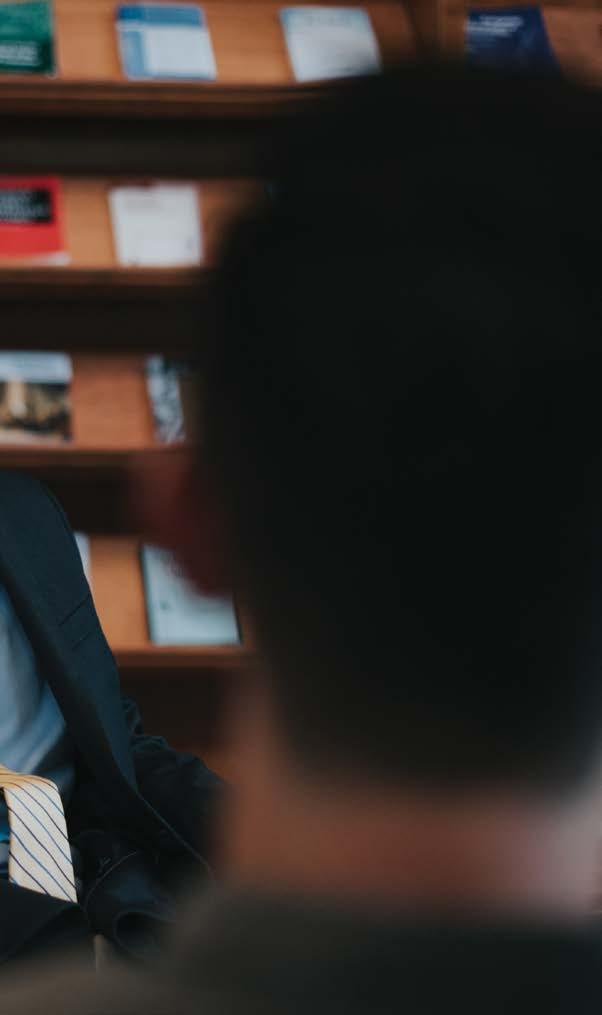
The liberal arts of logic and rhetoric are taught more obliquely through Westminster classes. Learning how to follow an argument and form an argument are essential for all areas of study. Students are required to engage with various debates through their class participation and exams. Papers are a crucial part of student development. Students find that the process of writing a paper, though painful, is one of the most beneficial assignments since it causes them to put into practice the skills that the professors have modeled in class. They must form their own thesis about the text or issue, seek to back it with sound arguments that engage with the arguments of others, and write in a style that communicates effectively.
More examples could be listed, but I hope it is clear how a Westminster education can help further develop the gifts and abilities of students called to teach. Our schools need reformed teachers who are spiritually mature and able to think carefully and deeply so that they are prepared for the crucial role they will have in the formation of our children. As a professor at Westminster, I feel humbled and blessed to be able to participate in training teachers for such a noble task.
7 wscal.edu
“Our goal is not just to fill students' heads with a bunch of facts but to train them to think, to equip them with a mental skill set for a life of productive scholarship.”
Joshua J. Van Ee is
Associate Professor
of Hebrew and Old Testament at Westminster Seminary California. Dr. Van Ee, his wife, Heidi, and their three children reside in Escondido.
PRAY
FOR WSC
Making Haste, Slowly
by JOSH FEIL
If there was an Olympics for “Famous Last Words,” “What Could It Hurt?” would easily be on the medal stand. Yet those very words were on my mind in Portland, Oregon, in November 2021, wondering whether or not my family could realistically move back to Southern California so I could finish my MDiv at Westminster Seminary California. “I’ll just send an email to ask about coming back. What could it hurt?” Possibly a lot. But it could be worth it. So, I clicked the send button.
A positive response from the registrar led to an application for enrollment, which led to an application for housing, which led to many conversations at home and church, which eventually led to a U-Haul reservation – and the rest is history. I got in…for the second time. But to tell the story of the first time, we need to rewind back to 2009.

I first heard about WSC during my senior year of college in San Diego. A friend took me to a talk by Dr. Horton on the topic of “Christless Christianity.” At some point I realized that Dr. Horton taught nearby at a school called Westminster. Noted. In addition, as my interest in pastoral ministry continued to grow, my pastor suggested that I look into the seminary further. So, I applied, enrolled, and started classes in the Fall of 2010. I didn’t really know anyone or anything about the school besides the data points above, yet there I was.
And I really struggled. The rigor and beauty of Reformed theological education was so new to me. Every day felt like running at altitude. Making matters worse, I considered myself an outsider and had a chip on my shoulder. I wanted to leave and study somewhere else – somewhere that felt less foreign. I remember talking to my advisor, Dr. Estelle, about all of this and this is what he said to me: “Just hold on. Give it a chance. Give it a year. If you still feel this way at the end of the year, let’s talk. Remember - we want you here.” Thanks to his exhortation, I stayed. And by the end of my first year, I was ready to come back for year two.
In time, I fell in love with the seminary and its
UPDATE | SPRING 2023
ON CAMPUS
HOMETOWN : Bakersfield, CA / PROGRAM : MDiv
commitments. The education proved to be rich and rewarding. After graduation in 2013 with a degree in biblical studies, my wife and I packed up and moved to Portland, Oregon. I wanted to pursue ministry of some sort, though it was not exactly clear what that would look like. After a couple of dead ends, a door opened to get coffee with the principal of a local Christian school. The coffee led to a part-time job, which eventually turned into a full-time job teaching Bible and theology to students between 7th-12th grade.
It was in this experience that the value of my education at WSC really started to become evident. All the most important emphases at WSC became my foundations and guardrails: The glory of God in all things, the sufficiency of God’s whole counsel, the gift of creeds and confessions, as well as a sober yet hopeful anthropology. In other words, the priorities of the seminary are not only true; they are also good, beautiful, and useful. And when one finds himself in regular hallway conversations with teenagers about faith and life, those foundations and guardrails become absolutely critical.
I had stumbled backwards into becoming a “teacher.” Yet God kept that lingering question of pastoral ministry aflame in the back of my heart. And actually, it was the time spent teaching the Bible and sharing life together with students and colleagues that kept my pastoral call alive.
How? Because aspects of that call were being expressed in very satisfying ways: I had about 100 hours with each class each school year to teach and relay the “faith once for all delivered to the saints” (Jude 3). The potential impact of that time is hard to overemphasize. For that reason alone, I would encourage any of our graduates to consider seriously an opportunity to work as a classroom teacher.
However, I increasingly felt that I needed to get an answer to the internal call to pastoral ministry. So, I approached my pastors and elders, and they counseled me to prayerfully consider licensure in the URCNA so I could test my calling through pulpit supply. I was licensed to exhort in summer of 2021 and stepped into a Reformed pulpit for the first time in five years. Suffice it to say, the congregation was very patient as I toddled my way through the summer.
Two things happened through the experience of licensure: it provided further confirmation of my internal sense of call, but also revealed a number of blind spots in my preparation for ministry. Blind spots? But I had been to seminary! Why did I feel so unprepared? Here’s my best attempt at answering that question: during my first time at WSC, I thought I could get a lot of what was being offered in the practical theology department through experience in my local church. There was some truth to that, but in the end it was insufficient.
I have come to realize there is no substitute for the combination of pastoral scholarship and vibrant community that WSC offers. There is a whole team of highly experienced pastor-scholars who are leading groups of men and women to embrace the call that God has placed on their lives. We need the experience of seminary – including practical theology. Why?
Because very few of us are rogue savants who can skip boot camp to command the special forces. Or, as Yoda said to a headstrong Luke Skywalker in The Empire Strikes Back, “Luke, you must complete the training.” As most of us are also not Luke Skywalker, it seems all the wiser to heed Yoda’s counsel.
I used to joke that I squeezed a two-year degree into three years. Now I can joke that I squeezed a three-year degree into thirteen. Was it wasted time? Not in God’s providence. The ancient adage Festina Lente means “make haste, slowly.” It accurately captures what God has done through these years. He did not waste any of the time between the times. Scripture says it even better: “Be patient, therefore, brothers, until the coming of the Lord. See how the farmer waits for the precious fruit of the earth, being patient about it, until it receives the early and the late rains. You also, be patient. Establish your hearts, for the coming of the Lord is at hand” (James 5:7-8). God is pleased to use both early and late rains to prepare us as he sees fit.
Here’s the truth: whether young or old, newcomer or latecomer, you will find in WSC a seminary that teaches in a thousand ways the power of God’s word to bring reformation not only to the church, but also to the heart – beginning, of course, with our own. As I pray toward ordained ministry, my hope is that the lessons learned as student, teacher, and student again will cultivate the humility needed to magnify Christ, his gospel, and his church.
So if you’re here, give thanks. If you want to be, give it a look. After all, what could it hurt?
PRAY FOR WSC Current Students
Please pray for our students as they prepare for a lifetime of faithful service to Christ’s church.
wscal.edu
“There is a whole team of highly experienced pastor-scholars who are leading groups of men and women to embrace the call that God has placed on their lives.”
9
Dr. Jason Pickard
Announced as Associate Professor of Systematic Theology
“I am grateful that Dr. Jason Pickard will be joining our faculty. He is a careful scholar, committed churchman, and experienced teacher who will strengthen the faculty and bless the students at Westminster.”
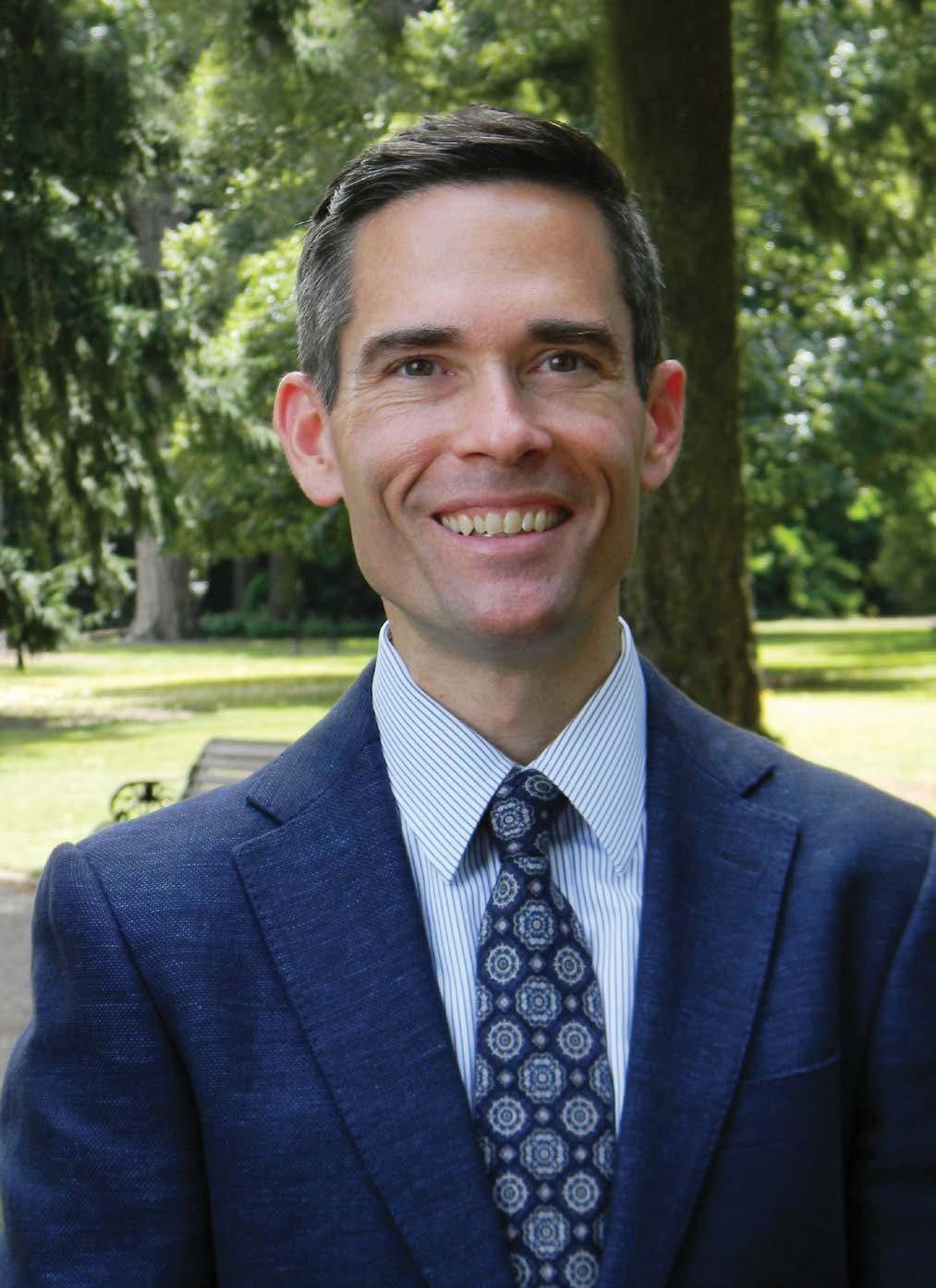
10 UPDATE | SPRING 2023 QUICK
FACTS Hometown Houston, Texas Moved from New Zealand
Married with 3 Children
Favorite Sports Cricket, Soccer, Tennis, Biking
JOEL E. KIM
WHAT I HOPE TO INSTILL IN MY STUDENTS
Westminster Seminary California is pleased to announce the appointment of Rev. Dr. R. Jason Pickard as Associate Professor of Systematic Theology at Westminster Seminary California, effective July 1, 2023. Dr. Pickard will begin teaching at WSC for the Fall 2023 semester.
President Joel E. Kim notes, “I am grateful that Dr. Jason Pickard will be joining our faculty. He is a careful scholar, committed churchman, and experienced teacher who will strengthen the faculty and bless the students at Westminster.”
Dr. Pickard was born and raised in Texas, later earning his B.S. from Texas A&M University. After earning his M.Div. at Westminster Theological Seminary in 2010, he obtained his Ph.D. in Systematic Theology at the University of Otago in New Zealand. His doctoral dissertation examined John Owen and T.F. Torrance on Christ’s mediation. His research interests include the doctrine of God, metaphysics, ecclesiology, Owen, Torrance, and Stephen Charnock.
In addition to his academic work, Dr. Pickard is a faithful churchman. Receiving his ordination in the Presbyterian Church in America (PCA), he has served various churches and Christian groups, including six years as campus minister with Reformed University Fellowship International at Texas A&M University. Most recently, Dr. Pickard has been serving as Associate Pastor of Grace Presbyterian Church of Ashburton, New Zealand.
Dr. Pickard has been teaching systematic theology at Grace Theological College in Auckland, New Zealand, since 2021. In addition, he has taught various courses in systematic theology, church history, and apologetics at Westminster Theological Seminary in Philadelphia since 2018.
Dr. Pickard and his wife, Sarah, have three children. We look forward to welcoming them into our WSC community this summer.
Hobbies
Research Interests
Doctrine of God, metaphysics, ecclesiology, T.F. Torrance, John Owen, Stephen Charnock
11 wscal.edu
“By God's grace, I hope to help students learn to think rightly about God and all things in relation to God. Theology Proper shapes how we understand all the other loci of theology, including pastoral theology. Ultimately, I pray that through our theological work in the classroom, the Lord would 'direct our hearts to the love of God and the steadfastness of Christ' because this is the real power of ministry.”
&
South Island of New Zealand reading fiction and memoirs country music making wheat bread
Interests Exploring
W. ROBERT GODFREY CHAIR
On March 18, 2023, Westminster Seminary California President Joel E. Kim announced the establishment of the W. Robert Godfrey Chair to honor the life and work of Dr. W. Robert Godfrey. This marks the fifth endowed faculty chair in the 42-year history of WSC and was made possible by the generous gifts of many friends of the seminary. President Kim made this exciting announcement at a dinner for WSC faculty, staff, and local friends of the seminary in conjunction with the annual den Dulk Lectures. Dr. Sinclair B. Ferguson served as the 2023 den Dulk Lectures speaker, and the seminary was blessed by his presence during this celebration dinner.
Dr. Godfrey’s distinguished career spans more than 43 years. He began teaching church history at Westminster Theological Seminary in Philadelphia in 1974, prior to commencing his teaching career at WSC in 1981. He became president in 1993, following Dr. Robert G. den Dulk from 1988-1993, and Dr. Robert B. Strimple from 1982-1988. As the third president of the seminary, Dr. Godfrey guided the faculty and staff through decades of substantial growth, while preserving WSC’s unswerving fidelity to Scripture as summarized in the Reformed confessions. During his tenure as president, he also formed the wonderful culture of the seminary, often reminding faculty, staff, and students that “we take the gospel seriously, but we do not take ourselves seriously.”
At his retirement in the summer of 2017, Dr. Godfrey became President Emeritus and Professor Emeritus in Church History at the seminary. In addition, the WSC Board of Trustees and President Joel E. Kim asked Dr. Godfrey to continue his involvement as a teacher of church history at WSC. He is an ordained minister in the Escondido United Reformed Church (formerly the Escondido Christian Reformed Church), where he has taught the adult Sunday School for 41 years. He serves as a Ligonier Ministries teaching fellow and Chairman of the Ligonier Board. Former students, fellow parishioners at EURC, and friends of Ligonier especially appreciate Dr. Godfrey’s witty and engaging teaching style.
The WSC faculty and Board of Trustees will determine the designated department for this chair in the near future. In the meantime, friends of Westminster Seminary California are encouraged to consider making additional gifts to this endowment and to advance the mission and work of the institution.
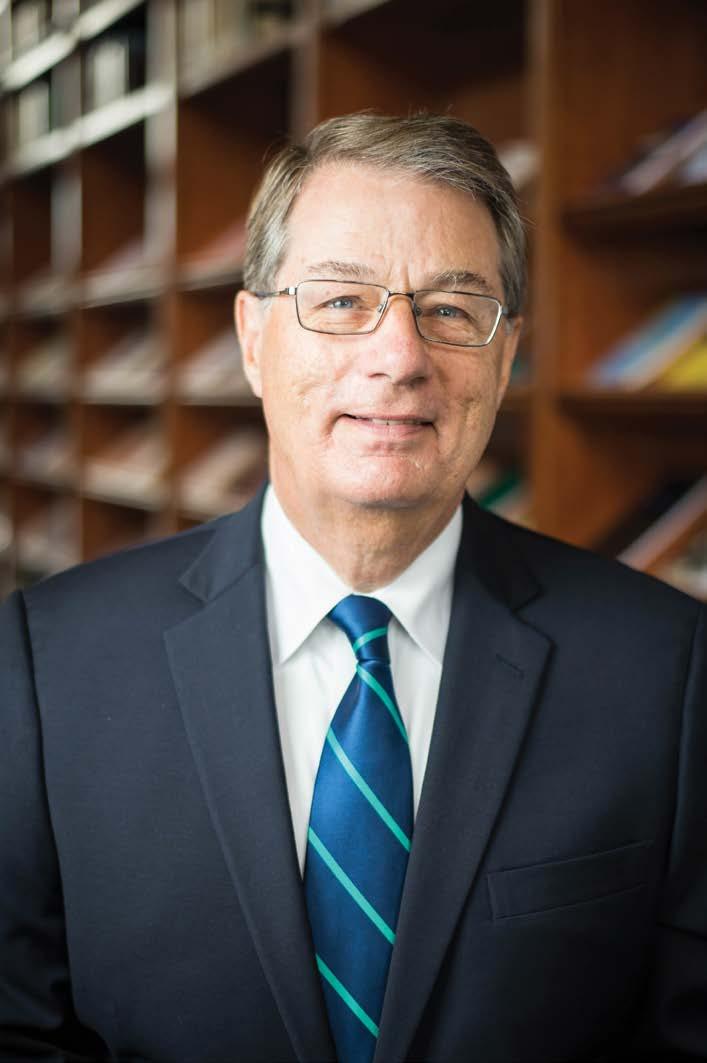
12 ANNOUNCING THE
UPDATE | SPRING 2023
“We take the gospel seriously, but we do not take ourselves seriously.”
W. ROBERT GODFREY
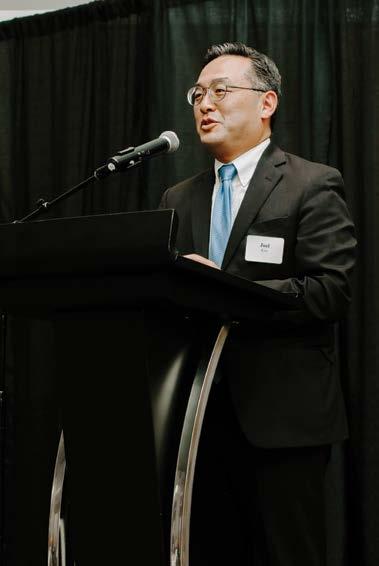

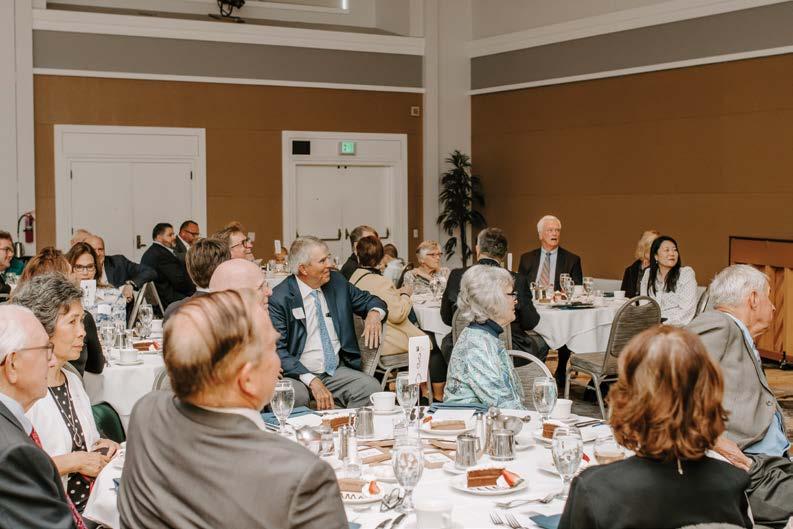
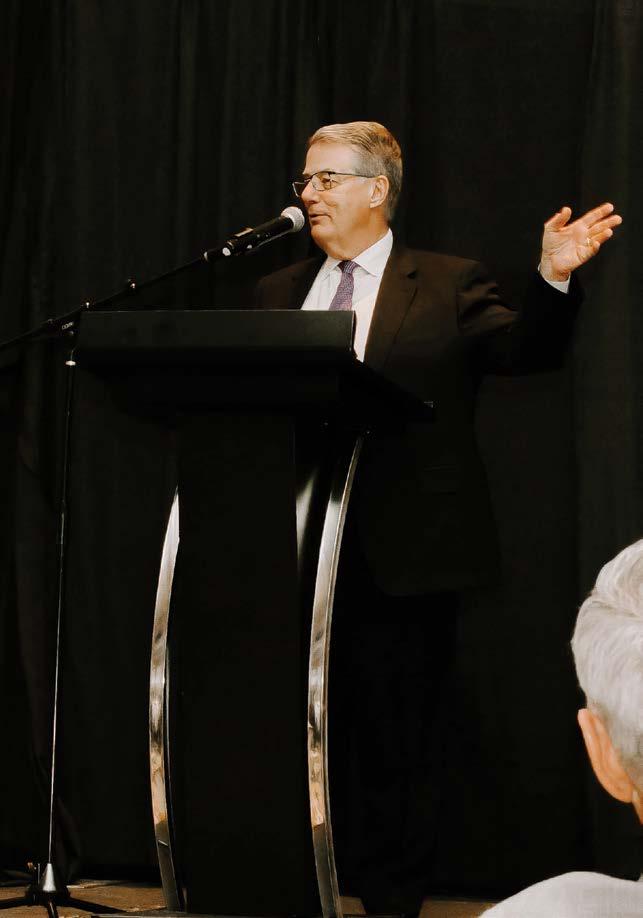
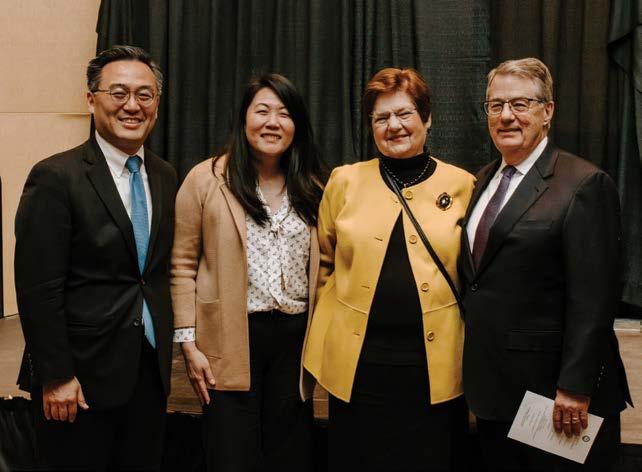
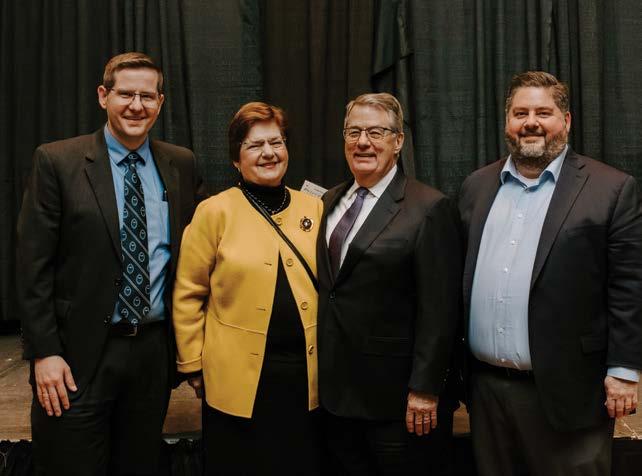
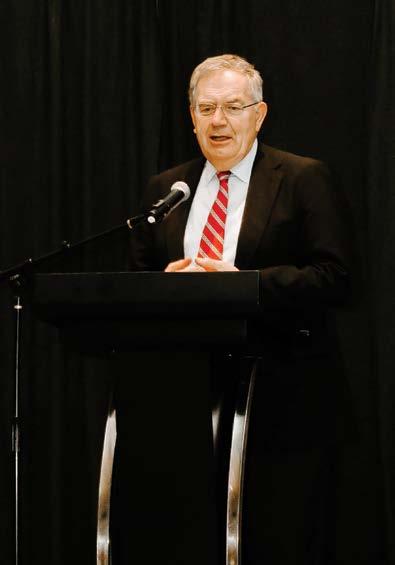
13
CLOCKWISE FROM TOP LEFT: Mary Ellen Godfrey, Dr. Sinclair B. Ferguson, W. Robert Godfrey; Dr. Godfrey speaking; President Joel E. Kim, Sharon Kim, Mary Ellen Godfrey, Dr. Godfrey; Robert Godfrey, Mary Ellen Godfrey, W. Robert Godfrey, William Godfrey; Dr. Ferguson speaking; President Kim speaking; attendees at the dinner program
Dr. Sinclair B. Ferguson Delivers den Dulk Lectures
A CHRIST-LIKE MINISTRY
In 1993, the Robert G. and Nellie B. den Dulk Lectures on Pastoral Ministry were endowed by friends of Westminster Seminary California and by the den Dulks. In appreciation for the den Dulks’ 30-year service to the Westminster Seminaries in Pennsylvania and California and in recognition of their passion for the preparation of pastors to preach the Word of God faithfully and powerfully, WSC designated the proceeds of this endowment to bring an experienced pastor to the campus each year to encourage students and offer wise counsel regarding the rigors and joys of shepherding Christ’s flock. In celebration of the 30th anniversary of the establishment of this lecture series, WSC organized a special edition of this annual event. The lectures were held on a Friday and Saturday, March 17-18, in order to accommodate more public guests. The seminary community was thrilled to see capacity crowds attend each day of the lectures. In addition, WSC held a Seminary for a Day event in conjunction with the lectures, allowing around 20 prospective students and their spouses to attend the lectures, sit in on classes, tour campus, and meet with faculty and enrollment staff.
The seminary was blessed to host Dr. Sinclair B. Ferguson as the 2023 den Dulk Lectures speaker. Dr. Ferguson serves as a Teaching Fellow for Ligonier Ministries and as Chancellor’s Professor of Systematic Theology for Reformed Theological Seminary, as well as a preaching associate in Trinity Church in Aberdeen, Scotland. He formerly served on the faculty of Westminster Theological Seminary in Philadelphia. His pastoral ministry has included serving as minister of Unst, in the Shetland Islands; St. George’s-Tron Church in Glasgow; and First Presbyterian Church, Columbia, South Carolina. His publications have ranged from academic works to books for children. Dr. Ferguson and his wife, Dorothy, have been blessed with three sons and a daughter and have twelve grandchildren.
The theme for Dr. Ferguson’s lectures was “A Christ-like Ministry.” Pastors and teachers are frequently urging their hearers to grow in all things into Christlikeness. This, after all, is the
destiny their Heavenly Father has planned for them (Romans 8:29). But how does that apply to the life and work of the pastor and preacher himself? While it is appropriate for pastors-intraining to spend much of their time learning to interpret and communicate God’s Word, often there is too little emphasis on pastors becoming more like Christ. Dr. Ferguson explored several aspects of the importance of a Christ-like ministry, encouraging and challenging the WSC students in attendance with his exhortation.
His opening lecture, “Having the Affection of Christ,” reflected on the importance of pastors having a deep love for their people when ministering to them. This affection for God’s people, Dr. Ferguson explained, flows out of one’s affection for Christ. His second lecture, “Developing the Mind of Christ,” examined what it means to possess a Christ-like mind and why it is necessary for ministry. At its essence, developing the mind of Christ means developing a humble spirit that looks first to serving others. As such, having this humble mind of Christ is fundamental to pastoral ministry. As a special treat for Saturday’s attendees and viewers online, Dr. W. Robert Godfrey, WSC President Emeritus and Professor Emeritus of Church History, joined Dr. Ferguson before the third and final lecture for a time of shared reflection on their years of ministry. As the nearly 300 attendees present can attest, this time was filled with wit, laughs, and wisdom.
Audio and video recordings of the 2023 den Dulk Lectures are available to view on the Westminster Seminary California website and YouTube page.
14 UPDATE | SPRING 2023
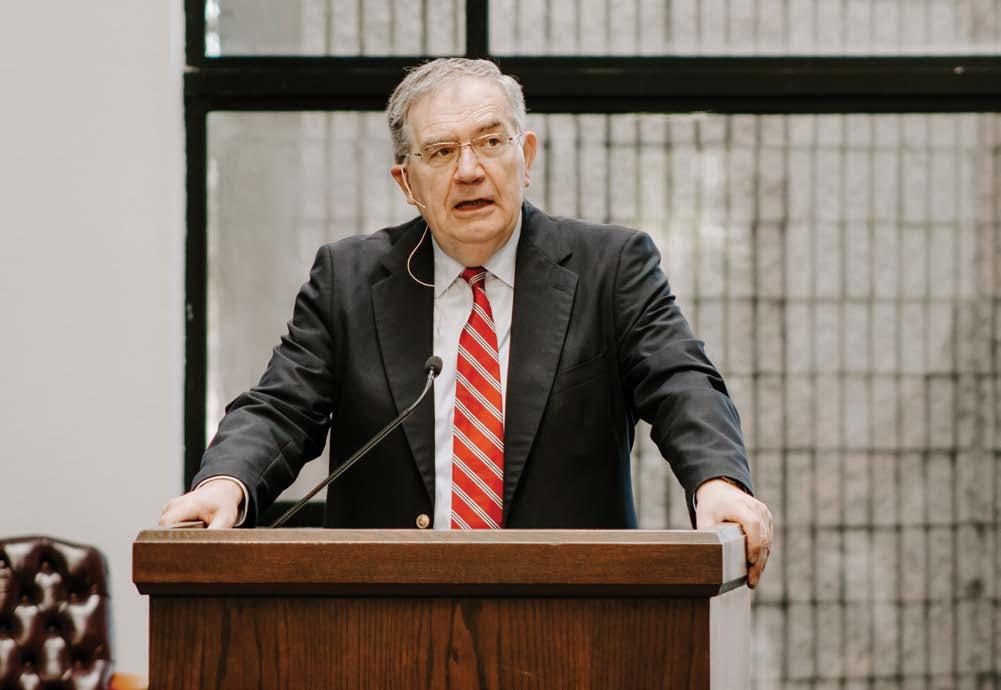



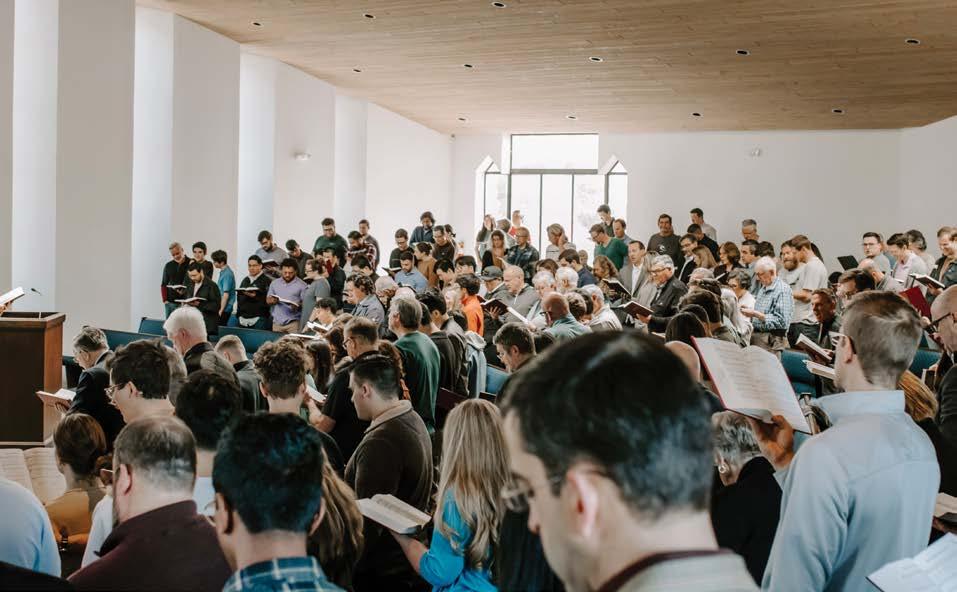
15 wscal.edu
“Has it ever crossed our minds that the place where we are called to be most like the Lord Jesus is when we’re preaching?”
DR. SINCLAIR B. FERGUSON
From Faith to Faith
2023 ANNUAL CONFERENCE
The 2023 Annual Conference marked the 19th year of this gathering of alumni and friends of the seminary on the Westminster Seminary California campus. The WSC faculty established the conference to support the Church in addressing, from the Word of God as confessed by the Reformed faith, issues of interest and importance to churches in North America and around the world. The conference also provides a glimpse of the teaching that takes place at WSC throughout the year. In 2021 the Annual Conference was cancelled at the last minute due once again to the pandemic. The seminary was pleased to offer this year’s conference in person. It meant a great deal to the faculty to be able to deliver their messages face-to-face. This format is consistent with the WSC commitment to in-person residential instruction in the context of a community of faith.
This year’s conference explored various facets of doctrine and life as they touch upon the centrality of faith in the Christian life. John Calvin said that faith is the axis around which everything in the Christian life rotates. The 2023 Annual Conference
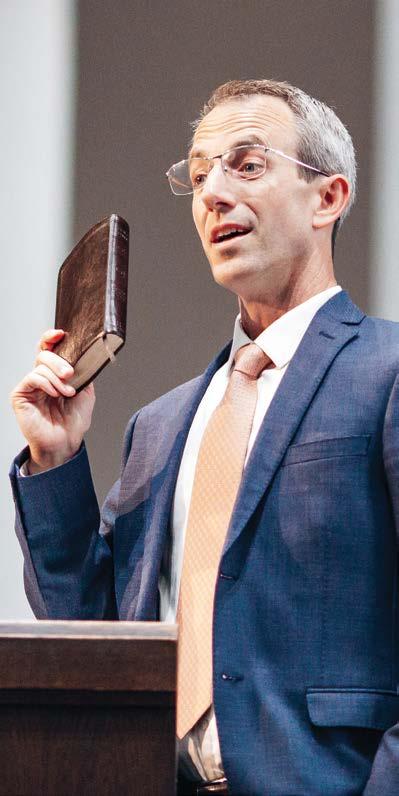
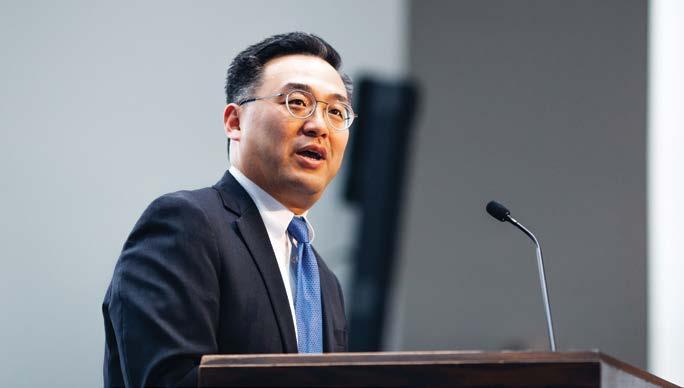
theme, “From Faith to Faith,” examined the nature, heart, gift, challenges, and hope of faith. Dr. Michael S. Horton kicked off the conference by reflecting on the anchor of our faith. He explained that the Christian faith is not wishful thinking or having faith in faith itself. Rather, Jesus Christ, crucified, risen, and reigning, is the anchor of the Christian’s faith. There is a great comfort in understanding the objective nature of the Christian faith.
Dr. A. Craig Troxel opened the second day of the conference by addressing the heart of faith. The author of With All Your Heart (Crossway, 2020) explained that the core of true faith – trust – comes from our heart. The Reformation was not only about the recovery of the heart of faith, but a restoration of a more robust and biblical view of the heart itself. WSC President Joel E. Kim followed with a discussion of the gift of faith, specifically the church’s reception and sharing of the faith. He noted that the church has a glorious and sacred duty to pass down the faith from generation to generation in every nation, tongue, and people group. President Emeritus Dr. W. Robert Godfrey

then explored the crisis of faith. Despite some preachers promising health and wealth for followers of Jesus, in reality the Christian life is not an exemption from the trials and tribulations of this sin-stricken world. Dr. Godfrey provided biblical answers to legitimate Christian questions: How long? When? Why? Dr. Bradley J. Bitner brought the conference to a close by considering how faith and hope are intimately connected. In hope, Abraham believed despite apparently hopeless circumstances. Having been justified by faith, Christians hope even while they suffer. Through the Spirit, by faith, we hope in Christ with patience and eager expectation. This focus on hope was a comforting and encouraging conclusion to the 2023 Annual Conference. Please visit the conference page on our website to view each conference session.
What a joy it was to welcome so many friends and alumni back to campus for this two-day event. We hope you will join us next January for the 2024 Annual Conference, which promises to be a time of spiritual nourishment, Christian fellowship, and Southern California sunshine.
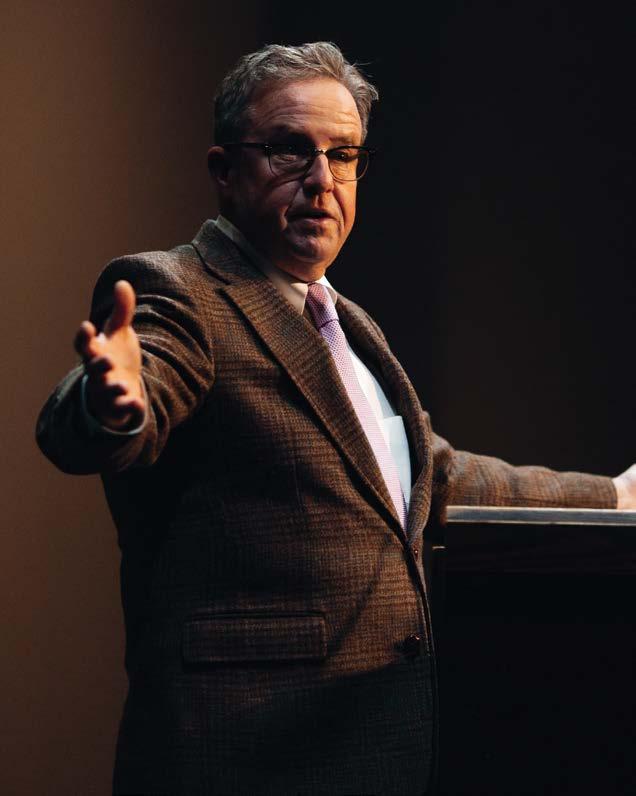
The Heart of Faith
“If we had a thesis this morning, it would go something like this: If faith is born in the heart, then it ought to reflect all that the heart is and all that the heart does. In other words, if faith is that place or origin, is that place where our faith is seated, then you would think that our faith would function in a similar fashion. Now to assert that faith originates in the heart is hardly anything
worth proving. We could find ourselves spinning our wheels proving the obvious. Faith is, indeed, conceived in the heart when the gracious power of the Holy Spirit enables the heart to take hold of the Word of God in fertile soil. Our Reformed confessions affirm this…. But what does that faith look like? And that presses us to that other question of how does the heart function? The heart is the governing center of the person. And when we think of the heart in a simple way, it is the unity of who we are within. In scripture, heart is a word that encapsulates various functions comprehensively. And we see the complexity of who we are within. Many times in scripture when we see the word heart, the emphasis is on the mind of the heart – what we know. Other times it is on the desires of the heart – what we love. Or the will of the heart –what we choose. In terms of that former idea that the heart is simple enough to reflect the unity of our inner being, this reflects the simplicity and integrity of who we are within, similar to the words soul,
spirit, and conscience. Heart refers to that totality and is perhaps the first thing we should assume when we see this word in scripture. As Proverbs 4:23 tells us, the heart is the headwaters from which flows the springs of life…. In this sense, we can think of the heart as the control center. It is in the driver’s seat. It is at the helm of the ship. As goes the heart, so goes the man…. But the heart is also complex, and in this sense it is unique from the other words that we have to describe who we are within. It is different from soul, spirit, and conscience. It is comprehensive. It captures this threefold complexity. And now we are talking not only about the integrity of who we are, but the nuances of the way that scripture captures who we are. There are three functions of the heart in scripture: our mind, our desires, and our will….”
You can watch each of the conference lectures on WSC's Youtube page: YOUTUBE.COM/ WESTMINSTERSEMINARYCALIFORNIA



wscal.edu
Excerpt from A. Craig Troxel’s 2023 Annual Conference Message
“The heart is the governing center of the person. And when we think of the heart in a simple way, it is the unity of who we are within.”
18 UPDATE | SPRING 2023 Do you know a future pastor? Theologian? Bible teacher? Scholar? Tell them about Seminary for a Day! Easy registration at WSCAL.EDU/SFAD Donʼt forget about our travel grant! WSC is delighted to reimburse prospective students for up to $400 of your travel expenses. This can be applied toward airfare, car rental, gas, and more. Plus, we'll arrange up to two FREE nights of lodging for you! OCTOBER 27, 2023 In-person campus event for all prospective students OCTOBER 9, 2023 Virtual event for international students
The 10th and final building is scheduled for completion in August and opening its doors to the new students who will be joining us for the 2023-24 academic year. Upon completion, the seminary anticipates that about 25% of the total cost of the new building will be funded.
Please pray with us that funds will be provided to reduce the remaining debt and how you might help. This project, on average, cuts the housing costs in half for students and blesses the many families who call the Westminster Village home.
I am proud that my wife and children are now just as much a part of WSC as I am. I am thankful that my wife has been supported and shaped by her newfound sisters, and that my children were able to experience the love and support of such a community. We have all been changed for the better by it.”
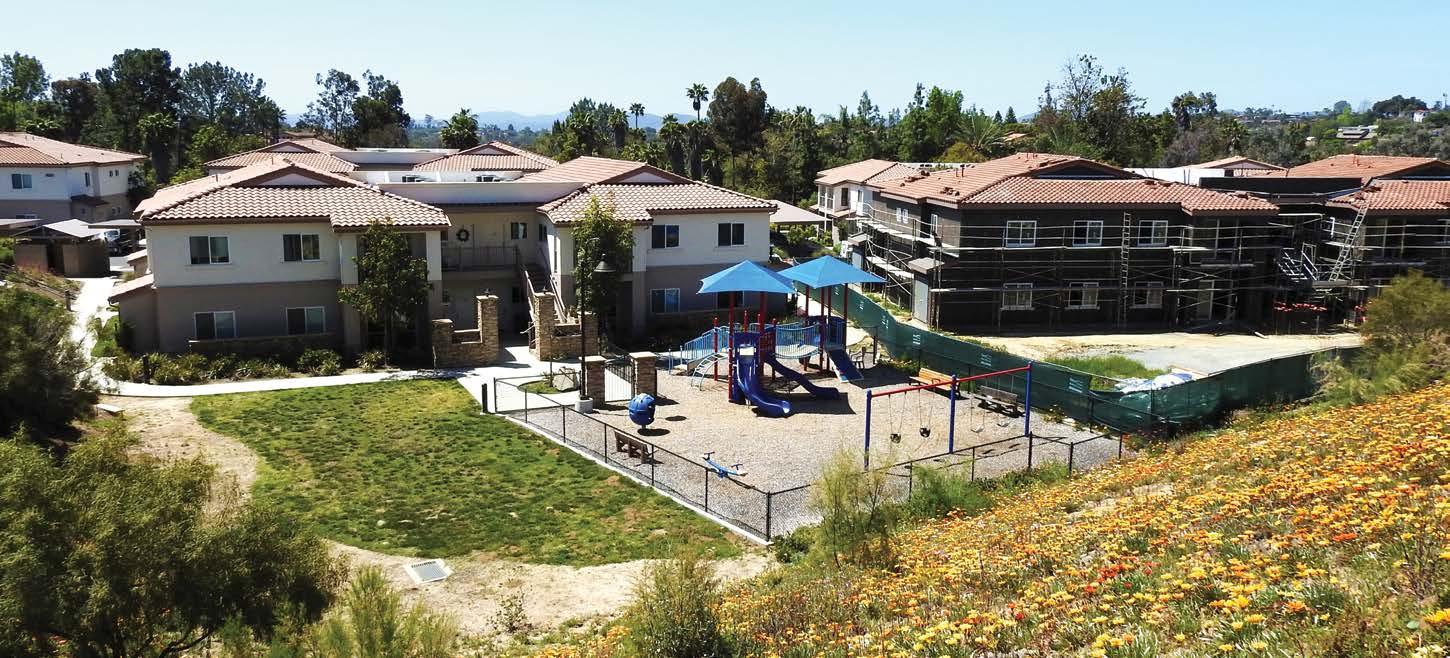
19 wscal.edu 75% owed 25% funded commons building residential buildings individual units
9 72
prayerfully consider a gift to help complete the Westminster Village for Christ, His Gospel, and His Church. Please contact us with any questions: DEVELOPMENT@WSCAL.EDU or 888-480-8474
1
Please
“This community has been a blessing for my family.
VILLAGE RESIDENT
A Lifetime Apprenticeship
by JUDITH RIDDELL
It’s hard to believe that 20 years ago, I was cramming hard for my first-year exams at Westminster Seminary California. Sometimes it feels as if my three years at WSC must have happened to somebody else, their days being so far removed from my life today, teaching English in south Belfast, Northern Ireland. I am still in the same school I left in 2002 to study for my MA in Biblical Studies, but although I returned there in 2005, I was not the same person. And so when I think that those leisurely days drinking Starbucks in the sun and studying Greek participles (no, Dr. Van Ee, despite what you had us repeat ad nauseam, they were not, and never would be, my friends!) must have belonged to a different life, I think again. I know that they belong to me. I know that they are part of me and who I became and how I am.
I am so deeply indebted to Westminster, not just for its academic excellence and its rigorous curriculum, but for its generosity and love. Courses were taught with grace (though examined by law!) where professors clearly cared about the truths they were delivering and cared about the students they were teaching. More than once I saw professors (some of whom you will hear being quite caustic in podcastville) cry over the gospel, caught unawares by the power and the immensity of what they were proclaiming. I was taught a lot, but I learnt a lot more.
I came back to teach with a deeper understanding of my faith and a truer understanding of myself. And a renewed love of learning. I had enjoyed all my courses at WSC, but Dr. Darryl Hart’s courses on evangelicalism in America had a significant impact on my understanding of the spirituality of the church and the influence of the wider culture on church polity and practice. I have to confess I dabbled a little with a PhD in historical theology as I settled back into teaching, focusing on evangelicalism, pietism and revivalism in Irish Presbyterianism. If anyone else wants to pursue this, I have about 18 months’
worth of notes under a spare bed I could dig out! Eventually, though, I gave up and gave in to the reality that my vocation was in the field of education, not historical theology, and thus I began my research into literacy development in a digital culture.
Yesterday our school senior book club was discussing Fahrenheit 451. The pupils thought about how there are more ways to burn books than simply by using flame throwers. Developing literacy in an environment that encourages the immediate and the instant and leaves teens satiated with the shallow and the sensual is quite a challenge. Increasingly many of us see the outsourcing of independent thought to the search engine of Google and the homogenisation and weaponization of ideas gleaned from whatever social influencer is on whatever digital platform trending today. In the 1950s, Ray Bradbury could only imagine three or four screens as the walls of a living room. Little did he imagine the screen that is simply an extension of the body for many in 2023. However, it is not all doom and gloom. The digital culture also provides such open access to so much literature, to so many ideas, if we could only inculcate an appetite to seek them. I suppose that’s my job! The pupils in book club were very optimistic that the dystopia Bradbury imagined could not now take place; now we can carry a culture of classics simply in our phones. They were much more optimistic than I; the fact that there were only 8 of them in a senior school of 400 might have given them pause for thought!
I teach three days a week and do a little part-time work for our local university, mentoring and assessing post-graduate teaching students. As time has moved on, even from my graduation in 2005, there has been a seismic shift in the culture in which I live, the digital nature of society speeding up the rate at which ideas spread and embed. This shift away from a ‘social imaginary’ (thanks, Charles Taylor, is anyone now not using this term?!) undergirded by Judeo-Christianity, to one increasingly
20 UPDATE | SPRING 2023 ON MISSION
“I came back to teach with a deeper understanding of my faith and a truer understanding of myself.”
informed by a post-modern activism, is, of course, true in all modern liberal democracies in the West and has been thoughtfully discussed in Carl Trueman’s The Rise and Triumph of the Modern Self. This can complicate life and work in the secular world, yet studying at Westminster has given me the categories to help untangle conflicting ideas in cult and culture and to help bring some contentment, but not – I hope - complacency, as I live and work in an increasingly suspicious secular space. I also can’t thank Dr. VanDrunen enough for his work and writing on two-kingdom theology, which is a great support when thinking about vocation with an eternal perspective.
But we have still much to be thankful for in Northern Ireland. This morning, I was able to lead our weekly student scripture union prayer meeting in my classroom before the start of school. Although we now have an LGBTQ+ club which started last year, we can still run our senior and junior scripture unions at lunch various times each week. SU (founded in the UK in the 19th century to help spread the gospel to children and young people) was instrumental to my Christian growth when I was at school – and most state schools in Northern Ireland have a scripture union club, all of which are allowed to meet in schools at lunch times or after school. We also don’t have Christian schools in Northern Ireland, and so there are still many Christian teachers and pupils in the state sector. For such salt and light, we should be extremely grateful. The school is not the church, and keeping these distinctions clear has been a great help in understanding my role in the classroom. I love teaching English Literature, and the curriculum continues to allow for breadth as the pupils get older, studying poetry from Chaucer, Renaissance literature and lots of fiction from Jane Austen to Philip Roth and Toni Morrison. This is a real privilege. But it is also a privilege to engage pupils with the gospel outside of class time too, a privilege we should not take for granted.
I have a pretty ordinary life. Westminster taught me to cherish the ordinary, I think one of the professors even wrote a book about it! I learnt to value the ordinary means of grace, the quiet simplicity of reformed worship, the ordinary ups and downs of the Christian life. Being part of the body of Christ is a reminder of the preciousness of the seemingly humbler parts of the body. I have been greatly blessed by visiting older people in my congregation and hearing them sing old hymns and remember passages of scripture learnt even before World War II. Many of these older folk find it hard to remember much in their daily lives, but once you start singing ‘What a friend we have in Jesus’ everything is word perfect. They often have very little, but they often have a joy that the teenagers I teach in school simply would not be able to comprehend. This, too, is an education.
I am enriched by worshipping in the church where I was baptised 51 years ago. I can visit my old Sunday School teachers and pray with those who taught me my first memory verses and teach the grandchildren of those who led me in youth fellowship. Since Covid, I have discovered the real blessing that one-to-one Bible studies can be, round the kitchen table. I am able to go to others’ houses and study God’s word, evangelising and discipling other women. Sometimes these studies are a
great encouragement. Recently I was studying one of the gospels with a lady in her late seventies. She had come back to church after about 30 years and was still unsure of what she believed. After a number of weeks where we had discussed who Jesus was and why Jesus came and how He lived a perfect life for us and how He took the punishment for our sins, she had seemed to grasp the truths of the gospel. However, week after week, she came back to the same idea, that she hoped she would be good enough to get to heaven. I thought of the importance of categories again. I loved my biblical studies courses, but I loved my systematic theology too! Now, I know the fashionable arguments for losing the theological terms to make the gospel more understandable and accessible. Here is my experience. I plunged in and we went to Romans and I explained the difference between justification and sanctification. After I had finished, she looked up… and she burst into tears. She couldn’t believe it. I couldn’t believe her reaction. What comfort we can bring when we do not deny God’s sheep the clarity that such terms bring, the clarity of the gospel of salvation.
One 20th-century philosopher of education wrote of how education is about initiation, about a beginning in learning, an apprenticeship that starts and also continues. True education is not about bench marking and standardised test scores and exam technique and cramming for finals. Education is about growing in true understanding. In an educational environment that often focuses on the functional nature of education, on it being a means rather than an end, a system that seems to value programming children rather than teaching them, it can also help to recall that education was once thought to be a good, not simply for the realm of work, but chiefly for the hours of leisure. Westminster Seminary initiated me into the field of theological study, inspired my love of God’s word and the reformed faith. Westminster introduced me to a lifetime apprenticeship, a love of learning, an appreciation of my vocation, a love of His church and a desire to grow in my understanding and knowledge of my God and the faith He has given me.
I am filled with gratitude.
Judith Riddell has a BA in English Literature and Language, an MEd, an MA in Biblical Studies from WSC (2005) and a PhD in Education from Queen’s University Belfast (2017). She teaches English Language and Literature to 11-18 year olds in a grammar school for girls in south Belfast.

21 wscal.edu
“Education was once thought to be a good, not simply for the realm of work, but chiefly for the hours of leisure.”
Lifetime Learners
Alumni Return to Audit Classes
 by CASSADY GILMOUR
by CASSADY GILMOUR
Many alumni of Westminster Seminary California note that they did not recognize the full value of the exceptional education they received at this institution until several years, even decades, into their ministry. Certainly, there are some aspects they are grateful for immediately—all of that preaching practice is paying dividends as early as your very first Sunday in the pulpit of a church that now bears your name in the bulletin as the appointed under-shepherd of its flock. But there are some seeds, like those seemingly obscure issues that a particular professor spent an entire class period meticulously explaining, that may not bear discernible fruit for many years. When they do, these often lead to a growing desire for other information or skills that either were not available during their time in seminary or
simply may not be as fresh in their minds as they once were. This is where continuing education comes in.
One of the many benefits that our alumni enjoy post-graduation is access to free continuing education in the form of course auditing through our Listener’s Pass program. This can be applied to any WSC course, but the vast majority of alumni auditing takes place in our elective classes, particularly the week-long intensives offered during the Summer or Winter terms. In fact, each January one of the elective courses is selected to be our featured Alumni Winter Refresher Course and is intentionally scheduled for the week leading up to the Annual Conference. This provides an excellent opportunity for outof-town alumni to plan a special trip back to their alma mater for some continuing education and a reunion with fellow alums. The chance to trade a winter storm for a balmy breeze and some California sunshine is an added bonus! For those unable to make it to campus in person, the technological flexibility ushered in by the COVID-19 pandemic has brought the welcome addition of an occasional online audit opportunity for alumni.
This January, WSC was proud to offer a number of brand-new elective courses
that garnered an exciting level of engagement from alumni, both in person and online, with more than 100 alumni auditors in total. The 2023 Alumni Winter Refresher Course featured the welcome return of Dr. S.M. Baugh, everyone’s favorite living citizen of the first century (a running joke among former students, who even created a t-shirt in honor of his retirement with the slogan “First Century Hustle”). The dual in-person and online (for auditors only) format of this class allowed alumni to participate in person, around the U.S., and even from around the world. Many were drawn in by the opportunity to sit once again under the teaching of a top-notch New Testament scholar, with several alumni reminiscing on how much they enjoy Dr. Baugh’s unique teaching style and expressing gratitude for the chance to benefit from his wisdom again. The title of the course was The Millennium in Revelation, with content focusing on a syntactical, lexical, literary, and theological analysis of Revelation and other New Testament passages related to this topic. Alumni especially appreciated the “thorough grounding in biblical perspectives on the Millennium” (Mitchell Brittnacher, MAR, 1984) provided by Baugh’s ability to draw on other biblical texts to support
22 UPDATE | SPRING 2023
and better understand the Revelation passages he emphasized.
In addition to the excellent quality of this year’s Winter Refresher course and the joy of seeing a familiar face at the lectern, alumni reveled in the chance to be a student again. Stephen Baran (MDiv, 2017) remarked, “I didn’t realize how much I’ve missed being in the classroom. This was a great opportunity to enjoy quality teaching from afar.” As Baran notes, the online option for auditing this course allowed for unprecedented access to the classroom environment, fellow alumni, and the high caliber of scholarship that WSC is known for. With the choice to either join virtually via livestream or watch the lecture recordings at a more convenient time, this year’s Winter Refresher Course was made accessible to more alumni than ever before. The seminary is thrilled that so many pastors, teachers, scholars, and missionaries benefitted from this unique alumni perk.
Dr. Baugh’s course was not the only audit opportunity that alumni took advantage of this Winter. WSC was delighted to welcome Dr. James Berry, Doctor of Osteopathic Medicine, to teach a new elective titled Ministry & Addiction. An expert in his field, Dr. Berry serves as Professor, Chair, and Director of Addictions in the Department of Behavioral Medicine and Psychiatry at the West Virginia University
School of Medicine. He is also a ruling elder in the OPC and a member of the denomination’s study committee on abuse. This in-person-only course was well attended by current students, alumni, and members of the local Escondido community, many of whom requested that this class be integrated into the rotation of regular elective offerings at WSC. In the class, Berry surveyed the nature and effects of several specific substances as well as the spectrum of care available to individuals in need of addiction treatment. His primary goal was to equip students to identify addiction and other mental-health crises and compassionately assist parishioners or other individuals who suffer from them. Several alumni pastors particularly noted the relevance of the course to their current ministry and considered the content an invaluable supplementation to their education and experience.

To round out this remarkable line-up of new classes available to alumni auditors and current students alike, the seminary carried on her legacy of learning by inviting alumnus Mr. Wes Viner (MATS, 2018) back to campus to teach a course titled Christianity & Science in Historical Perspective. Viner is a PhD candidate at Princeton University and is writing a dissertation titled “Reading, Revelation, and Nature: Biblical Interpretation and Natural Philosophy in Early Modern England.” His course surveyed a wide range of historical interactions between Christianity and science, from Augustine to Galileo and Darwin to Dawkins, and considered the social, cultural, and political contexts that shaped these interactions. Another in-person-only course, this class brought a number of local alumni auditors back to campus in addition to the current students who registered. As seen in this issue of UPDATE magazine, WSC rejoices in the privilege it is to provide exceptional preparation for men and women who seek to serve Christ’s Church in education, academia, and other fields which cultivate lifetimes of learning among people created in the image of our infinitely wise God. We look forward to engaging even more alumni in future opportunities to audit, and teach, elective courses at WSC.
ALUMNI Reflections
“It was great to be immersed again in a biblical topic and pursue it to its natural goal, studying scripture for the sake of knowing scripture. Also enjoyable to see many names of old friends and colleagues in attendance online, commenting, etc.”
Brian Lee (MABS, 1998) on The Millennium in Revelation with Dr. Baugh
“As a pastor, I found the content of this class to be incredibly helpful for my ministry. I deeply appreciated the coupling of theological categories with real (and messy) ministry situations.”
Mike Awtry (MDiv, 2014) on Ministry & Addiction with Dr. James Berry
“Having practical courses like [Ministry & Addiction] helps to fill in gaps in my knowledge that are very relevant for my context. It makes me a better, more compassionate pastor.”
Steve Moulson (MAHT, 2001; MDiv, 2013) on Ministry & Addiction with Dr. James Berry
23 wscal.edu
“Steve’s worldclass exegesis of the subject… made clear [that] Revelation is an encouragement for Christians in our exodus journey home.”
Dale
Hanaoka (MDiv, 2001) on The Millennium in Revelation with Dr. Baugh
ALUMNI NEWS
If you have an update to share, we'd love to know! Email us at alumni@wscal.edu and be sure to include your name, graduation year, and degree received.
1982
Richard Kaufmann (MDiv) went home to be with his Lord and Savior Jesus Christ on February 18, 2023. His love and legacy will live on through his family, especially his beloved wife, Elizabeth (MAR, 1990).
1984
David Bennett (MAR, MDiv) and his team of partner groups with the non-profit organization Barrio Nuevo recently painted their 250th house for low-income senior citizens. His wife, Anne (MAR, 1986), retired from chaplaincy work at Florence Prison and is now ministering at Chandler Regional Hospital.
1993
Jim Newheiser (MAR, DMin) was promoted to Professor of Christian Counseling and Pastoral Theology at Reformed Theological Seminary in Charlotte, effective June 1, 2022.
1999
Stephen Phillips (MATS) was recently appointed to the position of professor of Systematic Theology at the Anglican Study Center of the Spanish Reformed Episcopal Church.
2000
Danny Hyde (MDiv) recently published his
latest book with Christian Focus Publications entitled This Is the Word of the Lord: Becoming Confident in the Scriptures.
2001
John Carter (MDiv) was appointed Assistant Professor of Pastoral Theology at Trinity Evangelical Divinity School after retiring as a Commander in the Navy Chaplain Corps. His teaching responsibilities in the new role include Pastoral Leadership, Pastoral Counseling, and Spiritual Formation, among other classes. Upon his reception by the Midwest Presbytery (OPC), an installation service was scheduled for April 21, 2023.
2008
Bryce Waller (MDiv) became the Senior Pastor of United Church of Bogotá in Bogotá, Colombia, in August 2022.
2009
Michael Brown (MDiv, MAHT) was recently called by Escondido URC as a missionary to Milan, Italy, after planting Christ United Reformed Church (URCNA) in Santee, CA, and serving there from 2003-2018. In Milan, he currently serves as the pastor of Chiesa Riformata Filadelfia. He and the church are currently working with three other congregations in Italy to establish the country’s only confessional Reformed and Presbyterian denomination.
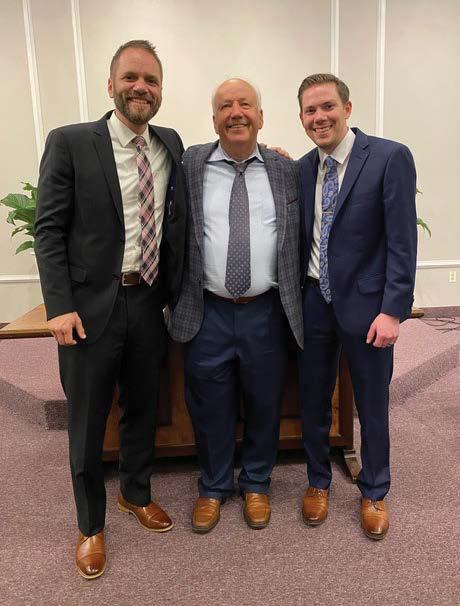
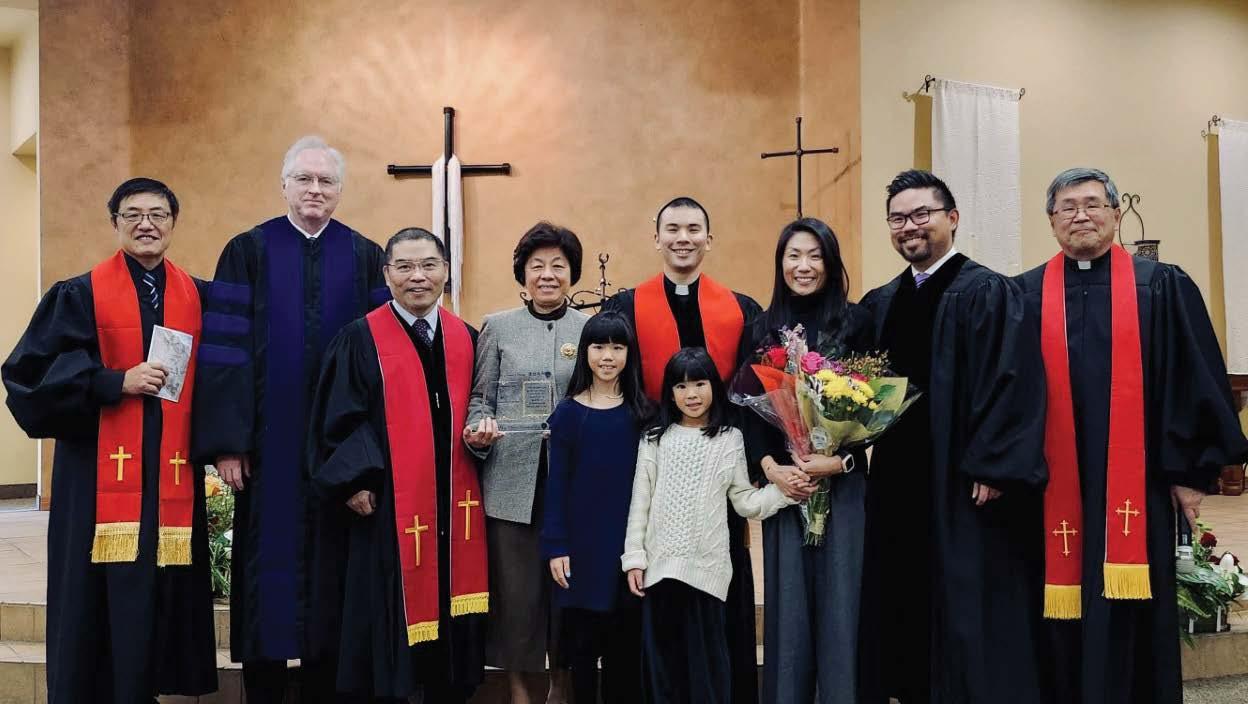
2012
Seung Gyun Kim (MDiv) and his wife welcomed their third son, Olevian “Ollie” Joel Kim on March 3, 2023. Both mother and baby are doing well.
2013
Shane Bennett (MDiv) recently became the associate pastor of Living Hope OPC in Gettysburg, PA.
Tim Taylor (MAHT) has been called to be the rector of Good Shepherd Anglican Church in Granbury, TX, beginning on April 1. It is a parish in the Episcopal Diocese of Forth Worth (ACNA) under Bishop Ryan Reed.
2014
Jonathan Hellman (MDiv) recently wedded his wife, Miraluna, on January 9, 2023.
2015
Luke Gossett (MABS) was granted concurring advice from the Classes Eastern US (URCNA) to be sent as a Home Missionary to his hometown of Birmingham, Alabama, overseen by Christ Reformed Church DC. Lord-willing, he and his family will move at the end of June to begin development efforts in Birmingham, and he covets prayer for this work.
2016
Dr. Philip Stewart (MATS) took on a new role as the Assistant Curate of St. Botolph’s Parish Church in Cambridge, England, in February 2023.
2017
Jonathan Cruse (MDiv) has written his third book, which is due to be released in April 2023 with The Banner of Truth, entitled The Character of Christ: The Fruit of the Spirit in the Life of our Saviour. Jonathan
24 UPDATE | SPRING 2023
LEFT: James Kong's ordination service with Dr. A. Craig Troxel; RIGHT: Dr. Stephen Fix, Dr. Bryan Estelle, and Chris Calvi
and Kerri Ann welcomed their third child, Caleb Cowper Cruse, on March 11, 2023.
Dan Warne (MDiv) recently joined the staff of Heritage Presbyterian Church in Warrenton, VA, as Assistant Pastor.

2021
Tiago Cunha (MDiv) welcomed his third son, Marcos Lima da Cunha, on February 18, 2023. He and his family praise the Lord for blessing them with another child.
Ty Gregory (MABS, MATS) and wife welcomed Mila Evangeline Gregory into the Gregory family in the summer of 2022. Ty is also in the process of transitioning out of education and into campus ministry with RUF and plans to be a campus minister by the Fall of 2023.
James Kong (MDiv) was recently ordained at the Taiwanese Lutheran Church of San Diego. WSC’s Robert G. den Dulk Professor of Practical Theology Dr. A. Craig Troxel participated in the service.
Ryan Miller (MDiv) was ordained and installed as an Associate Pastor of Arise Presbyterian Church in Vista, CA, on March 5, 2023. Associate Professor of New Testament Dr. Brad Bitner presided over the service.

2022
Amy Warren (MAHT) moved to Wheaton, IL in March to begin a new position at Crossway as Administrative Assistant in the Bible Editorial and Production department.
Chris Calvi (MDiv) was recently ordained and installed as the Assistant Pastor of Re-
formed Presbyterian Church (PCA) of Bowie in Bowie, Maryland. He will serve alongside fellow alum Dr. Stephen Fix (MDiv, 2007), the Senior Pastor of RPCB. Professor of Old Testament Dr. Bryan Estelle preached on Psalm 1 and 2 in the service and Jimmy Apodaca (MDiv, 2019) gave the charge.
Conrad Quiros (MDiv) was ordained on Saturday, April 1, in the North Texas Presbytery (PCA) and installed as the Campus Minister for RUF at Southern Methodist University in Dallas, TX. He and his family now reside in Dallas and rejoice to see the Lord at work drawing college students to Himself, growing them in grace, and leading them to love Jesus for a lifetime in the church.
WSC AT GENERAL ASSEMBLY
with Dr. Barrie
JUNE 12-16, 2023 | MEMPHIS, TN

RENASANT CONVENTION COMPLEX
Join us for the annual WSC Alumni & Friends Dinner on Wednesday, June 14!
Scan here to RSVP

Come see us in the exhibitor’s hall all week!
JUNE 7-13 2023 | PALOS HEIGHTS, IL
TRINITY CHRISTIAN COLLEGE

WSC is sponsoring dinner on Thursday, June 8 – we hope to see you there! [No RSVP necessary]
Be sure to stop by our exhibitor table on-site all week.
25 wscal.edu
50th General Assembly 89th General Assembly
OF THE OPC OF THE PCA with
Dr. Troxel
WSC Faculty Speaking at Colleges
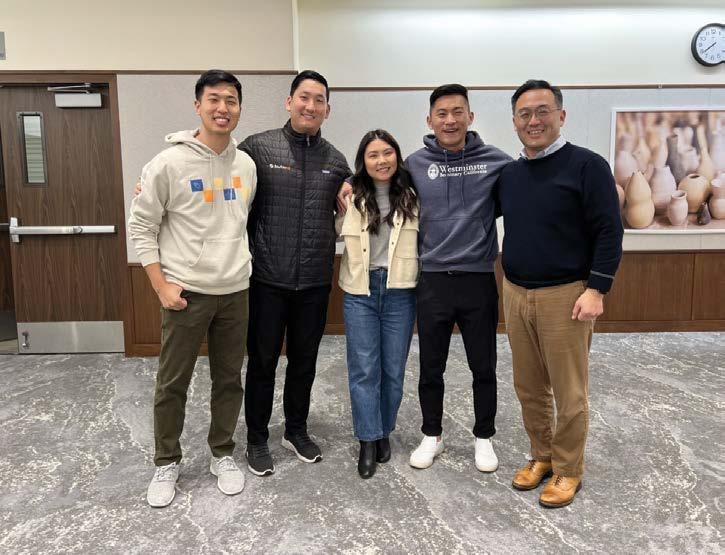
As Westminster Seminary California’s tagline states, our institution exists to serve the church. This is why WSC’s primary mission is to prepare men for ordained pastoral ministry, even while also preparing men and women for other vocations, such as teachers and missionaries. This commitment to serving the church also explains why any given Lord’s Day throughout the year will find one or more WSC professors preaching at churches around the United States and the world. In fact, our faculty members have served as pulpit supply 87 times over the last year at churches in locations ranging from Escondido to Cambodia. In addition to these many preaching engagements, our professors also speak regularly at undergraduate colleges and universities around the world. These speaking engagements not only introduce the seminary to college students, but they offer opportunities for WSC faculty members to encourage undergraduate students to remain faithful to biblical truth in a world that is hostile to God’s Word.
Last fall, Dr. David VanDrunen delivered a public lecture at Grove City College in Pennsylvania titled, “After Christendom: Christian and Politics in a Fractured World.” Dr. George Van Pelt Campbell, Professor of Biblical and Religious Studies and Sociology at Grove City College, summarized Dr. VanDrunen’s lecture as presenting “a Biblical perspective on why Christians need not despair as Western culture moves further from values that Christians hold dear. Arguing for cultural engagement but against attempting to Christianize American society, he [defended] a model of how Christians might engage in politics in a more
effective and winsome way that prioritizes the church bearing witness to the Gospel.” In addition to delivering this evening lecture, Dr. VanDrunen also taught in a Humanities class and met with Grove City faculty during his visit. This spring, Dr. A. Craig Troxel was blessed with the opportunity to speak at Grove City College as a guest speaker in its “From John, With Love” chapel series. Dr. Troxel spoke about the Good Shepherd from John 10:1-21.
In January, Dr. VanDrunen taught two weeklong intensive modules to graduate students at Mukhanyo Theological College at its Pretoria campus in South Africa. These modules examined the topics of Anthropology and Christology, respectively. While in South Africa, he visited the college’s Durbin center to deliver four lectures on “The Kingdom of Christ and the Ministry of the Church.” Two months later, WSC President Joel E. Kim spoke at Biola University’s Korean Campus Ministry. President Kim was pleased to enjoy the fellowship with some WSC alumni and prospective students at the gathering. In the coming months, WSC professors will continue to serve as guest speakers at college campuses around the world, including Dr. VanDrunen at Moore Theological College in Sydney, Australia; President Kim at Point Loma Nazarene University in San Diego; and Dr. Michael S. Horton at Queensland Theological College in Brisbane, Australia. Please pray for safe travels for our faculty members as they bring the Word of God to campuses and churches throughout the year.
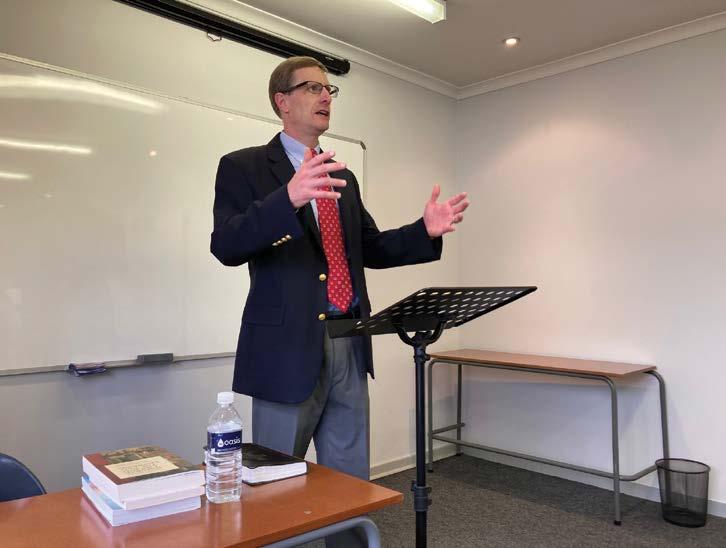
26 UPDATE | SPRING 2023 IN PERSON + IN PRINT
Dr. VanDrunen speaking at Mukhanyo Theological College; President Kim with Biola University’s Korean Campus Ministry
“They offer opportunities for WSC faculty members to encourage undergraduate students to remain faithful to biblical truth in a world that is hostile to God’s Word.”
UPCOMING SPEAKING ENGAGEMENTS
JUNE
4 | President Joel E. Kim preaches at New Life Mission Church Fullerton (Fullerton, CA).
5-9 | Dr. David VanDrunen speaks at Moore Theological College (Sydney, Australia).
11 | President Joel E. Kim preaches at King's Church (Long Beach, CA).
13-14 | Dr. David VanDrunen speaks at Lachlan Macquarie Institute (Canberra, Australia).
18 | Dr. A. Craig Troxel preaches at Escondido OPC (Escondido, CA).
JULY
4-7 | President Joel E. Kim speaks at Students for Christ National Conference at Point Loma Nazarene University (San Diego, CA).
16, 23 | Dr. A. Craig Troxel preaches at Escondido OPC (Escondido, CA).
30 | Dr. A. Craig Troxel preaches at Grace Bible Church (Escondido, CA).
AUGUST
6 | President Joel E. Kim preaches at Bethel Grace (Irvine, CA).
6 | Dr. David VanDrunen preaches at Reformed Presbyterian Church (Los Angeles, CA).
12-20 | Dr. Michael Horton teaches at Queensland Theological College (Brisbane, Australia).
13 | Dr. A. Craig Troxel preaches at El Camino Presbyterian Church (Goleta, CA).
27 | President Joel E. Kim preaches at Chinese Evangelical Church of San Diego (San Diego, CA).
9/30-10/1 | Dr. A. Craig Troxel speaks at Lakeview OPC Session Retreat (Rockport, ME).
OCTOBER
13-15 | President Joel E. Kim preaches at Baltimore Korean Church (Lutherville, MD).
27-28 | Dr. A. Craig Troxel speaks at Thousand Oaks OPC Reformation Conference (Thousand Oaks, CA).
28-29 | Dr. Bryan Estelle speaks at Grace OPC Reformation Day Conference (Sheboygan, WI).
FACULTY WRITING
For more faculty books, see the bookstore ad on p. 31 or visit us online at wscal.edu/bookstore
Justification by Faith Alone: Selected Writings from Theodore Beza, Amandus Polanus, and Francis Turretin

ED., R. SCOTT CLARK
The texts in this volume begin and end with this same point. Composed under different circumstances by giants of the Reformed tradition— Theodore Beza (1519–1605), Amandus Polanus (1561–1610), and Francis Turretin (1623–87)—they represent genres of classical treatments of the same doctrine. Each text explores aspects of justification from a different angle. Together they touch on a host of important theological concerns: the nature of faith, good works, sanctification, union with Christ, the Holy Spirit, hermeneutics, the unity of Scripture, and more. They are offered here in English translation for the first time.
ARTICLES
R. SCOTT CLARK
“Why You Should Change Your Mind about Reformed Scholasticism,” Credo Magazine (April 2023, Vol. 14:1).
DAVID VANDRUNEN
“Christians, Churches, and Public Aid,” Ordained Servant (April and May 2023).
“Revelation: Scripture and Covenant,” in Christianity and Constitutionalism, ed. Nicholas Aroney and Ian Leigh (Oxford: Oxford University Press, 2022): 327-46.
“The Relationship of Virtue and the Law of God: Early Reformed Thought and Its Contemporary Appropriation,” in Recognizing a Transcendent Good, ed. Petruschka Schaafsma, (New York: Routledge, 2022), 121-38.
Review of Natural Theology, by Geerhardus Vos, in New Horizons 44 (March 2023): 12-13.
BRYAN ESTELLE
“Sheol,” Tabletalk, August (46/08) 2022: pp. 9-10.
“Christ in the Psalms” Psalter/Hymnal Website (https://www.trinitypsalterhymnal. org/why-christians-sing-the-psalms/), July 2022.
“Tips for Reading the Prophets.” Available at Ligonier.org (Spring, 2023).
27 wscal.edu
BOOKS
This bible study can be found here: HERITAGEBOOKS.ORG
HONORARIUM & MEMORIAL GIFTS
Rev. John Bales
Rev. Dr. and Mrs. R. Scott Clark
Mrs. Doris Bergsma
Ms. Diann Otten
Dr. Richard W. Bishop III
Mrs. Diane B. Bishop
Rev. Dr. R. Scott Clark
Mr. and Mrs. Richard C. Wolfe
Mr. Henry and Mrs. Dawn Doorn
Rev. John Bales
Rev. Dr. and Mrs. Jason W. Barrie
Dr. and Mrs. Richard W. Bishop III
Rev. Dr. and Mrs. Bradley J. Bitner
Mr. and Mrs. Jim Bitner
Rev. Dr. and Mrs. R. Scott Clark
Rev. Dr. and Mrs. Bryan D. Estelle
Mr. and Mrs. Stephen Gilmour
Rev. Dr. and Mrs. Michael S. Horton
Mr. and Mrs. Mark Kats
Mr. and Mrs. James R. Lund
Ms. Ruth Ann Mansell
Dr. and Mrs. Marcus McArthur
Dr. and Mrs. William J. Montgomery
Rev. and Mrs. Charles A. Tedrick
Rev. Dr. and Mrs. A. Craig Troxel
Rev. Dr. and Dr. David M. VanDrunen
Rev. Dr. and Mrs. Joshua J. Van Ee
Ms. Barb Van Solkema
Mr. and Mrs. Brett Watson
Ms. Marilyn J. Frank
Mr. Burton D. Santee Jr.
Rev. Dr. W. Robert Godfrey
Mrs. Susan J. Andrews
Dr. and Mrs. Richard W. Bishop III
Mr. Edward Brower
Mr. and Mrs. Glen Brouwer
Mr. and Mrs. Brad Chang
Mrs. Edythe G. Adams
Mr. Gary B. Adams
Rev. Dr. Derke P. Bergsma
Mr. and Mrs. Dan W. Van Prooyen
Infant Andrew Josiah Bierling
Mrs. Sharon M. Pasma
Mr. John Boogaard
Mr. and Mrs. Ben Veendendaal
Mr. Elko Brouwer
Mrs. Clara Brouwer
Mr. Adam (Chau-Dung) Chang
Mrs. Su-Yin Chang
Mr. Arie de Jong
Mrs. Mary Vanderbyl
Dr. Robert G. den Dulk
Dr. Richard B. Gaffin
Mr. Earl Dragt
Mr. and Mrs. John H. Brower
Mrs. Trudy Goedhart
Mrs. Mary Vanderbyl
Mrs. Margaret Hamilton
Mr. and Mrs. Ben Veenendaal
Rev. Rollin P. Keller
Rev. Dr. and Dr. David VanDrunen
Mr. Steven David Kelley
Mrs. Kathryn Kelley
Rev. Dr. William H. Kooienga
Mrs. Marilyn Kooienga
Gifts Received from Nov. 4, 2022, through Apr. 25, 2023
Mr. and Mrs. Bill Dehaas
Mr. and Mrs. Lyle Faber
Mr. and Mrs. Gary L. Grauberger
Rev. and Mrs. Richard E. Landry
Mr. and Mrs. Andy Van Die
Mr. and Mrs. Ben Veenendaal
Mr. and Mrs. Ty Willis
Mr. Clyde and Carol Lems
Mr. and Mrs. Christopher J. Kuperus
Rev. Marcus J. Renkema
Rev. and Mrs. Todd V. Wagenmaker
Rev. Mark J. Stromberg
Mr. and Mrs. Ian G. McClure
Rev. Charles and Michele Tedrick
Dr. Gregory L. Weigler
Rev. Mark H. Vander Pol
Mr. and Mrs. Ian G. McClure
Mrs. Mari A. MacVey
Rev. and Mrs. Robert M. Godfrey
Rev. William C. Godfrey
Mrs. Jean McFadden
Rev. and Mrs. Richard Wynja
Mr. Keith Vander Pol
Mrs. Deborah Patterson
Infant Joel Brian Vos
Mrs. Sharon M. Pasma
Mrs. Marie Werner
Mr. and Mrs. Henry Doorn
Dr. and Mrs. James D. Paauw
Now you can remember that special someone through a tribute gift. Give “in honor” of someone special or “in memory” of someone who has died. And your gift will help support the students of Westminster Seminary California. Call 760-480-8474 ext. 102
HONORARIUM GIFTS provide an opportunity for you to celebrate a special occasion like an anniversary, birthday, wedding or graduation, to recognize an outstanding achievement, or simply show your appreciation to that special friend, colleague, or loved one.
MEMORIAL GIFTS provide an opportunity to express sympathy to a family who has lost a loved one. The dictionary defines a memorial as “something designed to keep remembrance alive.”
28 UPDATE | SPRING 2023 IN HONOR OF
IN MEMORY OF
Has someone touched your life in a special way?
GIVING FROM YOUR IRA
Making Kingdom Impact Through Your Retirement Assets
If you are 70 ½ or older, you can give to Westminster Seminary California from your IRA and receive significant tax benefits in return.

Benefits of giving from your IRA CONVENIENT. An easy way to give to your favorite charity.
TAX-WISE. Charitable distributions reduce your taxable income. This benefits you even if you don’t itemize deductions on your tax returns!
PROMISES KEPT. Gifts from your IRA can be used to fulfill any charitable giving pledges previously made.
IMPACTFUL. Gifts are tax-free to the charity. The entirety of your gift will go toward ministry!
Requirements of a Qualified Charitable Distribution
You can give to Westminster Seminary California from your IRA without any federal tax liability, as long as the gifts are qualified charitable distributions (QCDs). Distributions qualify for all or part of an IRA owner’s required minimum distribution (RMD).
• IRA holders must be age 70 ½ or older at the time of the gift.
• Give up to $100,000 per year as a single person or $200,000 per year as a married couple from separate accounts.*
• Distributions to donor-advised funds are not permissible
• Distributions may be made from IRAs including a traditional IRA, inherited IRA, SEP IRA (inactive) or simple IRA (inactive). Other retirement accounts are not eligible.
*This limit will be indexed for inflation, beginning in 2024.
Learn More
To learn more about IRA gifts or other smart and powerful giving options, contact us at 888-480-8474 or email development@wscal.edu.
This information is not intended as tax, legal or financial advice. Gift results may vary. Consult your financial advisor and legal counsel for information and advice specific to your situation.
Frequently Asked Questions
1. Do I receive a deduction for my gift?
No. Because the IRA assets haven’t been taxed, no deduction is allowed. To receive the deduction, you would be required to first treat the distribution as taxable income before taking the deduction. In most cases, it is better to not take the distribution as income.
2. How do I make a gift from my IRA?
Simply contact your IRA plan administrator, and request forms to make a charitable gift. Your administrator may even provide you checks you can write out for qualified charitable distributions directly from your account.
3. Can I give from my IRA to fund a life income gift?
Yes. As of January 2023, you can give a one-time qualified charitable distribution (or multiple QCDs within a single year) totaling no more than $50,000 to fund a life income gift.
4. What’s my deadline for end-of-year giving?
If your gift is coming directly from your IRA administrator, you must complete your paperwork in time for your administrator to send a check to the charity on or before December 31.
If you have been given an IRA checkbook, your check must be received AND PROCESSED by December 31. It is NOT enough that personal IRA checks are postmarked or even handdelivered by December 31.
Bottom line, your gift must be received and processed by December 31 in order for it to count toward your RMD. Furthermore, since IRA checks do not include your name and look very similar to standard bank checks (which have different guidelines), it’s a good idea to alert the charity when giving in this manner.
29 wscal.edu
Up Close with HENRY & DAWN DOORN:
As you consider your respective transitions toward retirement after a combined 40 years of service to WSC, what has changed and stayed the same at the seminary during your tenure?

As we reflect on the past 20 years of service to the development of WSC, we see God’s sovereign reign and hand of providence rule over it all. These years of service were not in our respective career plans, nor was there any thought that we would both work in the same place at the same time. The Lord used our differing backgrounds and prepared us for the privilege to articulate the mission of WSC, and to seek funding to advance its work. It became clear over time that we were “called” to work at the seminary.
The seminary has remained committed to its mission to prepare leaders and pastors for Reformed and Presbyterian churches and it has maintained its distinguishing characteristics of being biblical, confessional, pious, scholarly, and passionate about glorifying Christ, proclaiming His Gospel, and serving His Church. That preparation continues “in-person” on the WSC campus.
The four main changes that we have seen in our years at WSC are: (1) the doubling of the campus with the addition of a student-housing village – the largest capital initiative in the history of WSC; (2) an increasingly stable financial picture as the Lord has grown support with more donors and more alumni ministering in churches around the world; (3) an expanded global outreach and impact which have been a missional imperative for WSC’s geographical position on the West Coast; and (4) the smooth transition from President W. Robert Godfrey to President Joel E. Kim.
Please explain your philosophy of fundraising that you have instilled in the culture of the seminary.
Developing a culture of fundraising is about recognizing that the process is a “team” effort and that our purpose and goals must be rightly directed and clearly articulated. Our small development team has the objective of helping Christians grow as stewards who can experience the joy of generosity as they honor and obey God with their giving. We often refer to 2 Cor. 8:7 where Paul encourages generosity from God’s people. “But since you excel in everything – in faith, in speech, in knowledge, in complete earnestness and in love we have kindled in you – see that you also excel in this grace of giving.”
Paul knew that people needed encouragement in the “grace of giving.” But giving of our resources is preceded by building and maintaining trust, and the recognition that God owns it all. Establishing relationships for the long-term sustainability of WSC has been the most rewarding part of our work. But the fundraising part is imperative. National surveys show that a main reason people do not give is they are not asked. The Lord uses instruments and “askers” to advance His earthly kingdom.
Fundraising at WSC in many ways is ministry. We plant (begin the relationship), we water (cultivate and steward the relationship), we ask (God gives the increase). During this process we hope and pray that givers’ hearts would grow rich towards God and that the Lord would work through this asking and giving process to sanctify both the giver and the asker. The apostle Paul addresses this in his letter to the Philippians. “Not that I seek the gift, but I seek the fruit that increases to your
credit” (Phil. 4:17). Here again Paul seeks the gift for the growth of the giver so that the giver may increase (grow rich towards God) through the grace of giving to our Lord Jesus Christ. We are encouraged by friends of the seminary who embrace their role as stewards of their God-given resources and experience joy in their giving. Why do you think all Christians should prioritize supporting the mission of Westminster Seminary California?
“Faith comes from hearing and hearing through the word of Christ” (Rom. 10:17). There is no more important cause for us as Christians than to support the preparation of those who are called to bring the Gospel of Jesus Christ to a fallen world. The preparation of the men who will preach this good news is penultimate. The proclamation of the gospel opens and closes the door to heaven bringing eternal consequences. What could be of more importance?
“But how are they to call on him in whom they have not believed? And how are they to believe in him of whom they have never heard? And how are they to hear without someone preaching? And how are they to preach unless they are sent? As it is written, ‘How beautiful are the feet of those who preach the good news!’” (Rom. 10:14-15).
We thank God for the privilege of our work at WSC and pray for His continued provision – that the seminary may thrive as it serves Christ, His Gospel, and His Church.
30 UPDATE | SPRING 2023
CALLED TO ASK
Henry and Dawn Doorn are the Director of Stewardship and Vice-President for Advancement at WSC.
Transfiguration and Transformation

by Hywel R. Jones (Banner of Truth, 2021)
The Primary Mission of the Church

Engaging or Transforming the World?
by Bryan D. Estelle (Mentor, 2022)
Recovering Our Sanity
Politics After Christendom
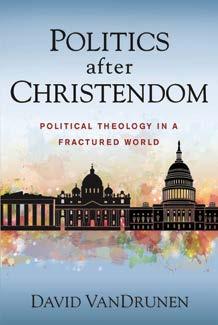
Saving the Reformation
The Pastoral Theology of the Canons of Dort
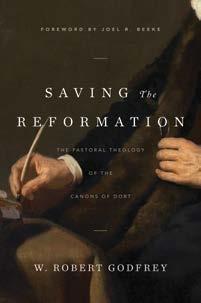
by W. Robert Godfrey (Reformation Trust Publishing, 2019)
Justification
2-Volume Series, New Studies in Dogmatics

by Michael S. Horton (Zondervan, 2018)
by W. Robert Godfrey (Reformation Trust, 2017)
Rediscovering
Spirit God's Perfecting Presence in Creation, Redemption, and Everyday Life

by Michael S. Horton (Zondervan, 2017)
Journeys with Jesus
Every Path in the Bible Leads Us to Christ
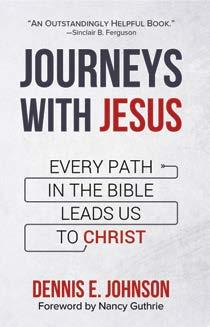
by Dennis E. Johnson (P&R, 2018)
How the Fear of God Conquers the Fears that Divide Us by Michael Horton (Zondervan, 2022) Core
Political Theology in a Fractured World by David VanDrunen (Zondervan, 2020)
What is the Priesthood of Believers?
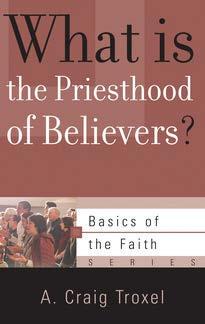
Basics of Faith Series
by A. Craig Troxel (P&R, 2019)
What is Man?
Basics of Faith Series by A. Craig Troxel (P&R, 2010)

Echoes of Exodus

Tracing a Biblical Motif by Bryan D. Estelle (IVP Academic, 2018)
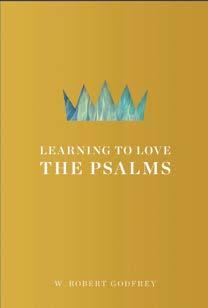
Aquinas Among the Protestants
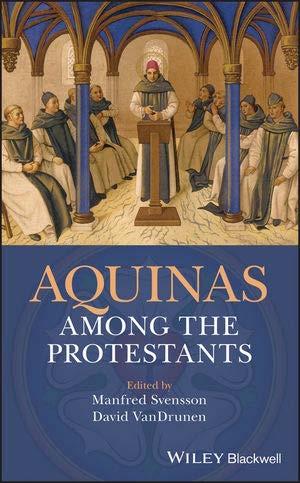
Edited by David VanDrunen (Wiley-Blackwell, 2017)
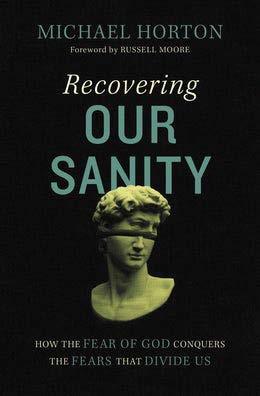
The Majesty on High Introduction to the Kingdom of God in the New Testament by S. M. Baugh (CreateSpace Independent Publishing Platform, 2017)
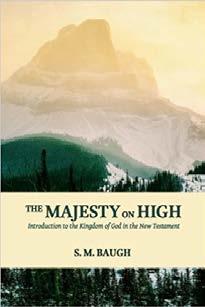
Ephesians
Evangelical Exegetical Commentary by S. M. Baugh (Lexham Press, 2016)

Finding Yourself in God's Story by Michael S. Horton (Zondervan, 2016)

God's Glory Alone
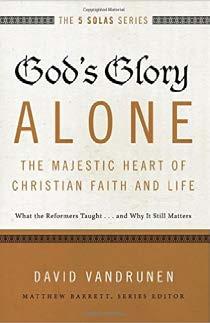
The Majestic Heart of Christian Faith and Life by David VanDrunen (Zondervan, 2015)
Calvin on the Christian Life

Glorifying and Enjoying God Forever
by Michael S. Horton (Crossway Books, 2014)
31 wscal.edu FACULTY BOOKS AVAILABLE NOW Visit our campus Bookstore! WSCAL.EDU/BOOKSTORE
the
Holy
Learning to Love the Psalms
Christianity
CALLED UPON TO LIVE IN HIS WORD,
to live as a community in His Word, to be guarding the Word, keeping the Word, growing in the Word, teaching the Word. That’s our purpose here— to teach the Word and to try to prepare teachers of the Word for the churches because, just as we cannot really prosper without the Word, so our school cannot prosper without the Word, and so our churches cannot prosper without the Word."
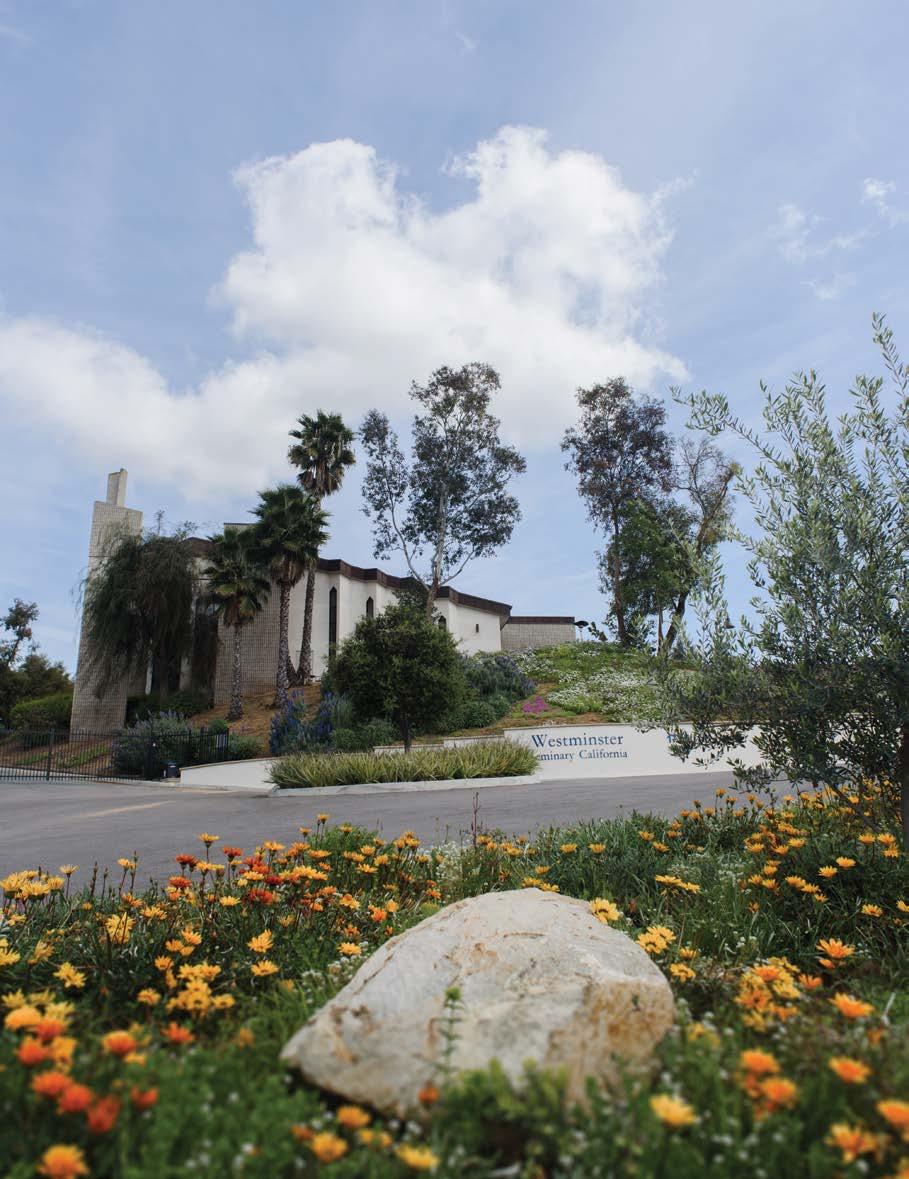 DR. W. ROBERT GODFREY President Emeritus, Professor Emeritus of Church History
DR. W. ROBERT GODFREY President Emeritus, Professor Emeritus of Church History

WESTMINSTER THEOLOGICAL SEMINARY IN CALIFORNIA
1725 BEAR VALLEY PARKWAY ESCONDIDO, CA 92027 WWW.WSCAL.EDU
“WE’RE
Interested in seminary? Contact our admissions team at ADMISSIONS@WSCAL.EDU or apply at WSCAL.EDU/APPLY




































 by CASSADY GILMOUR
by CASSADY GILMOUR































 DR. W. ROBERT GODFREY President Emeritus, Professor Emeritus of Church History
DR. W. ROBERT GODFREY President Emeritus, Professor Emeritus of Church History
